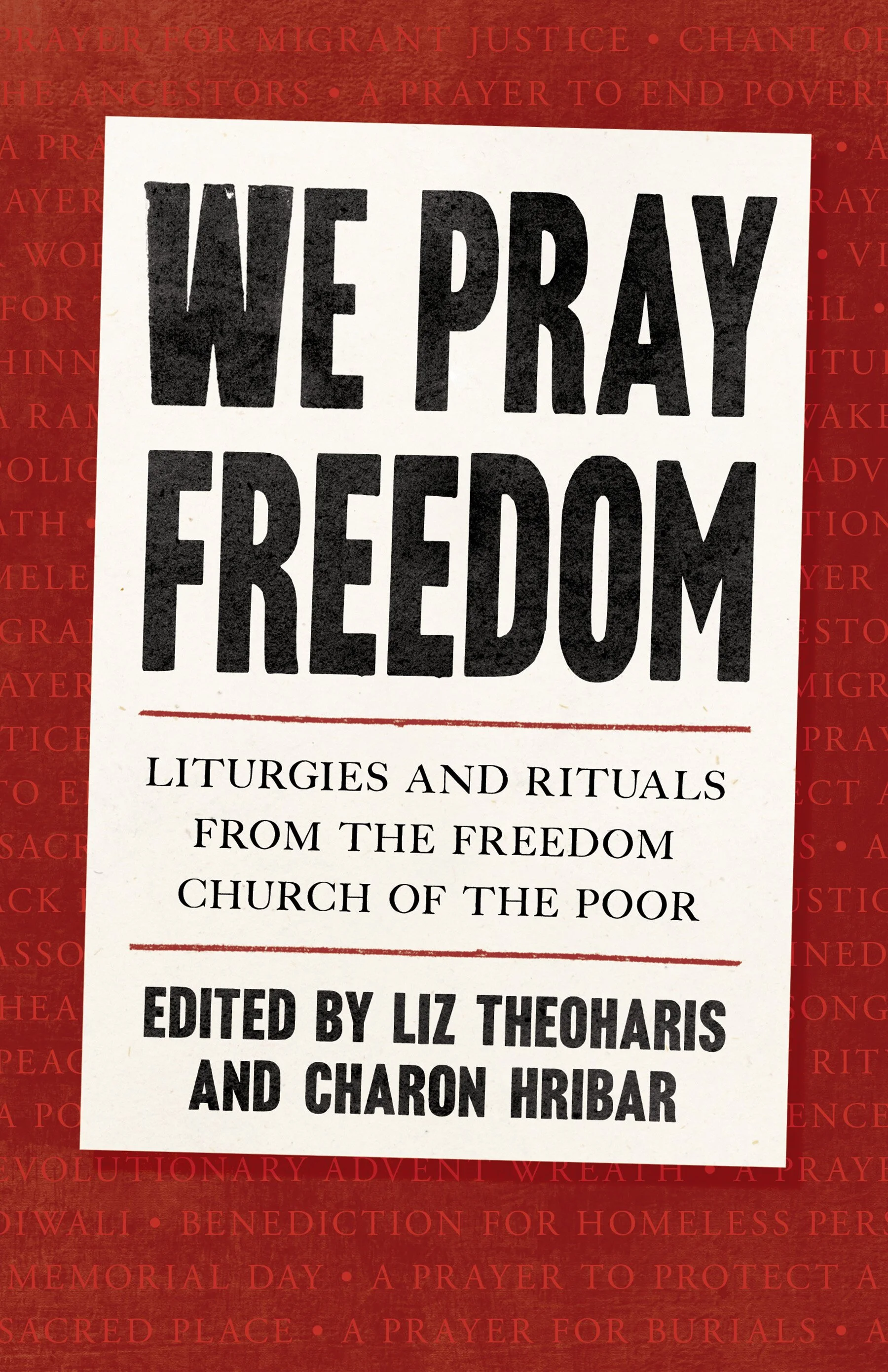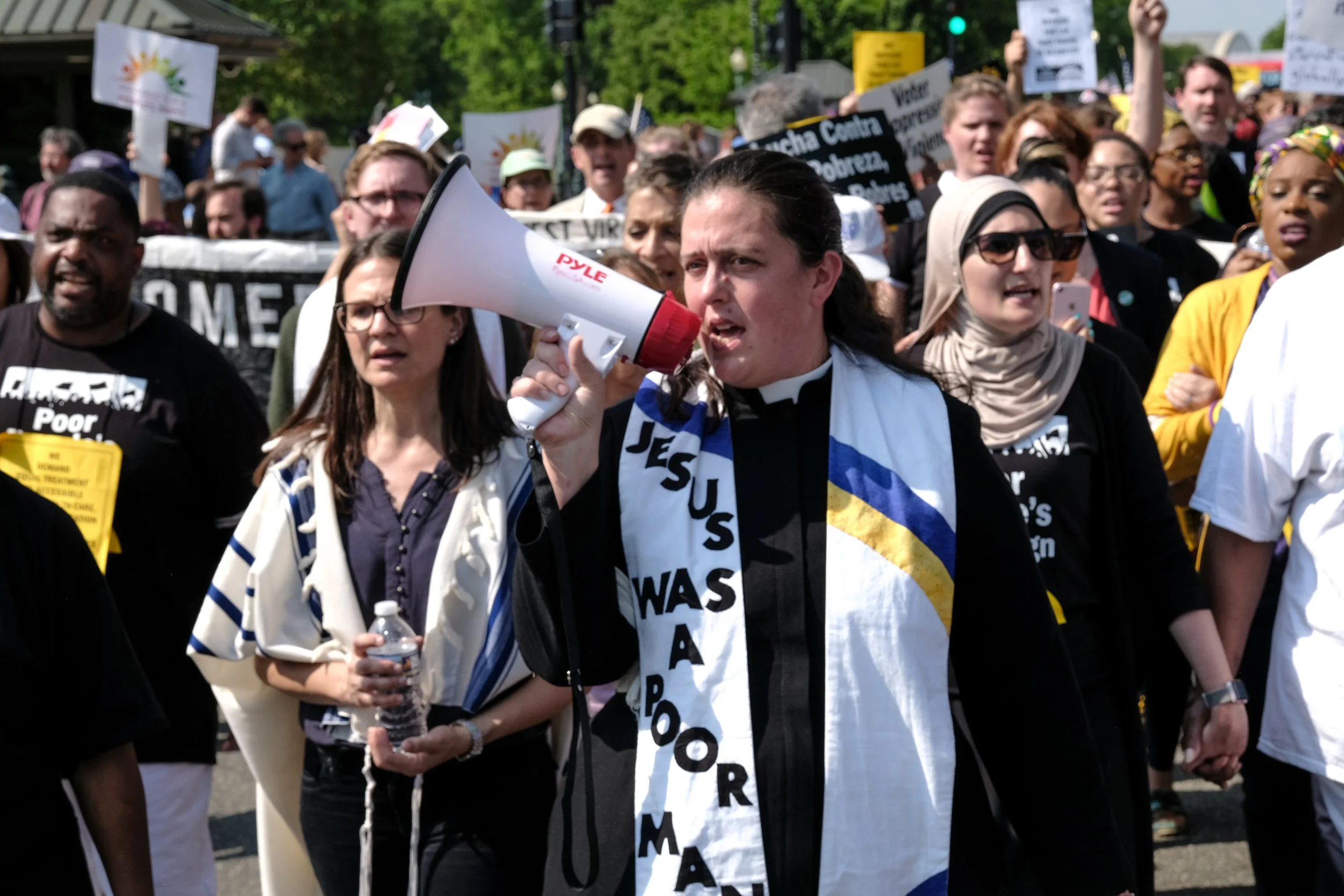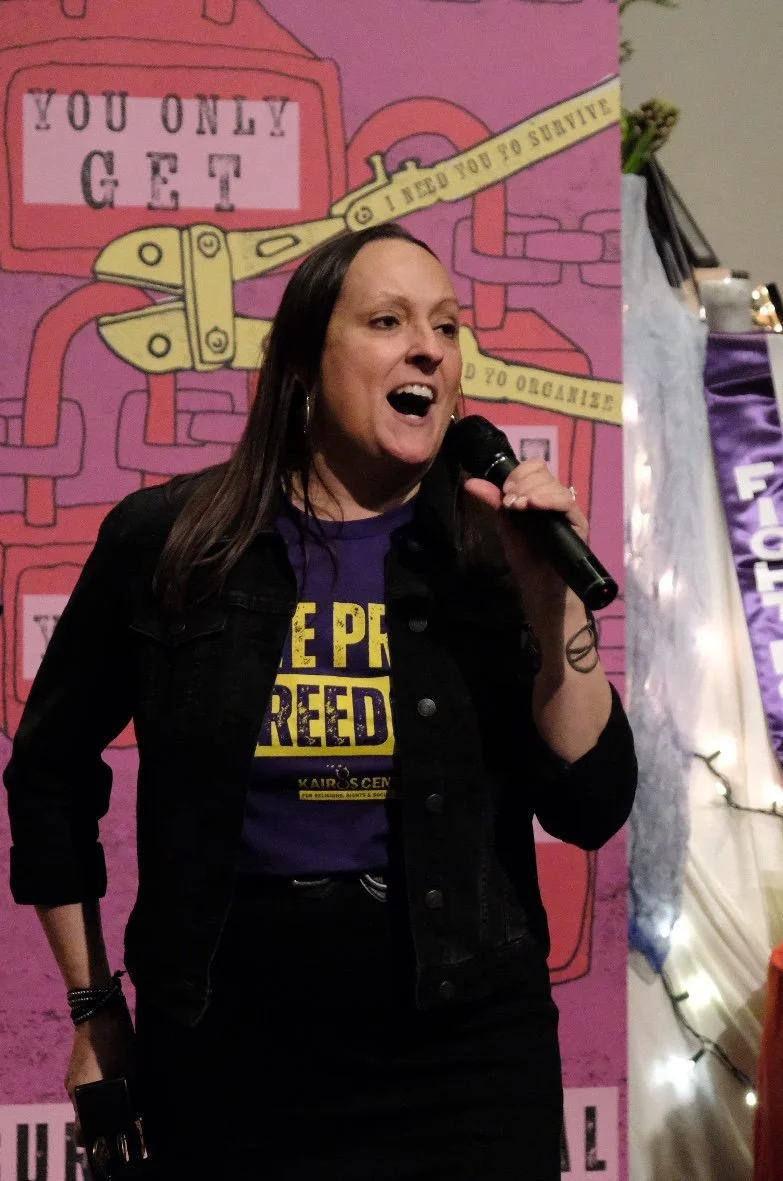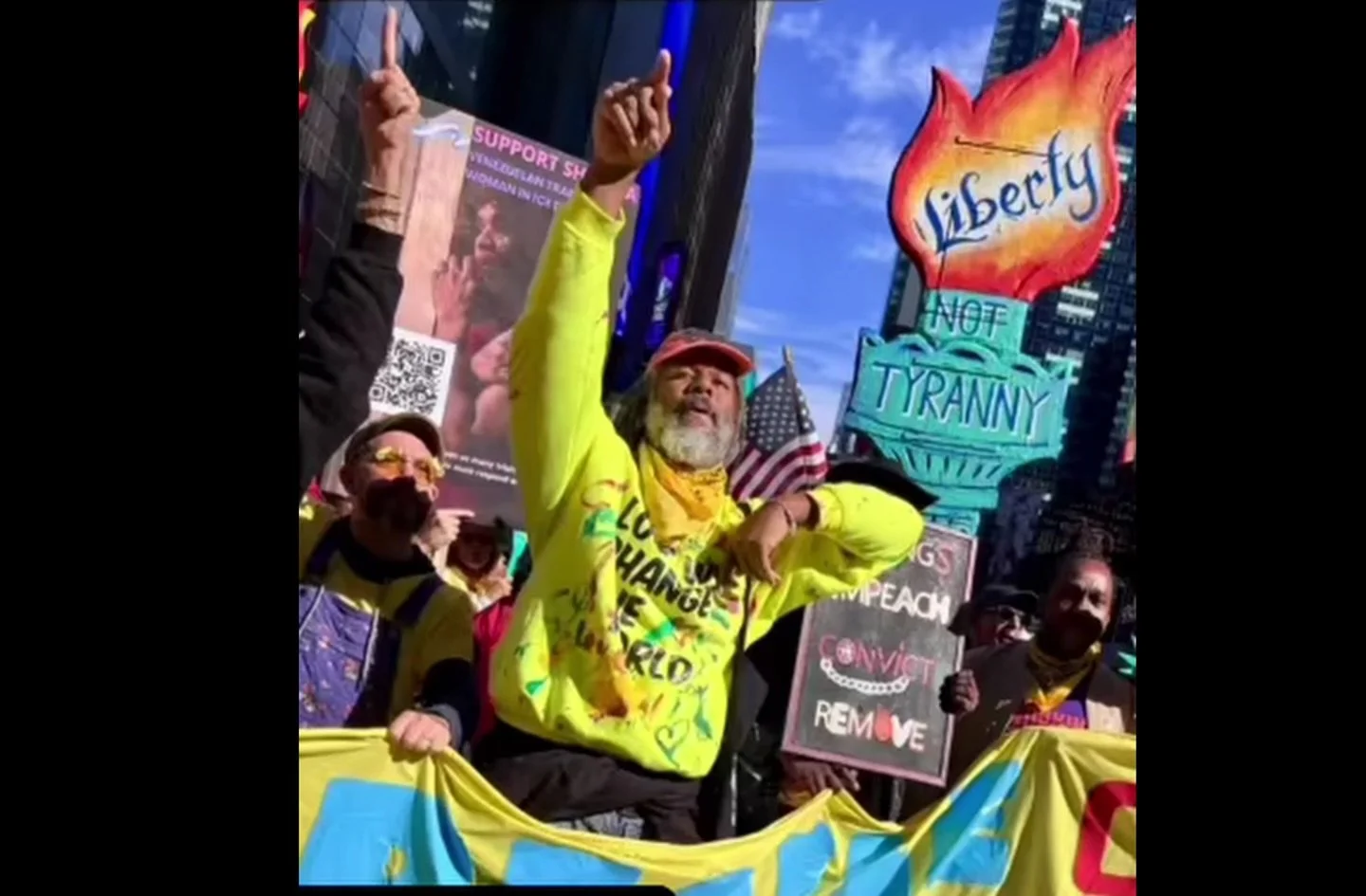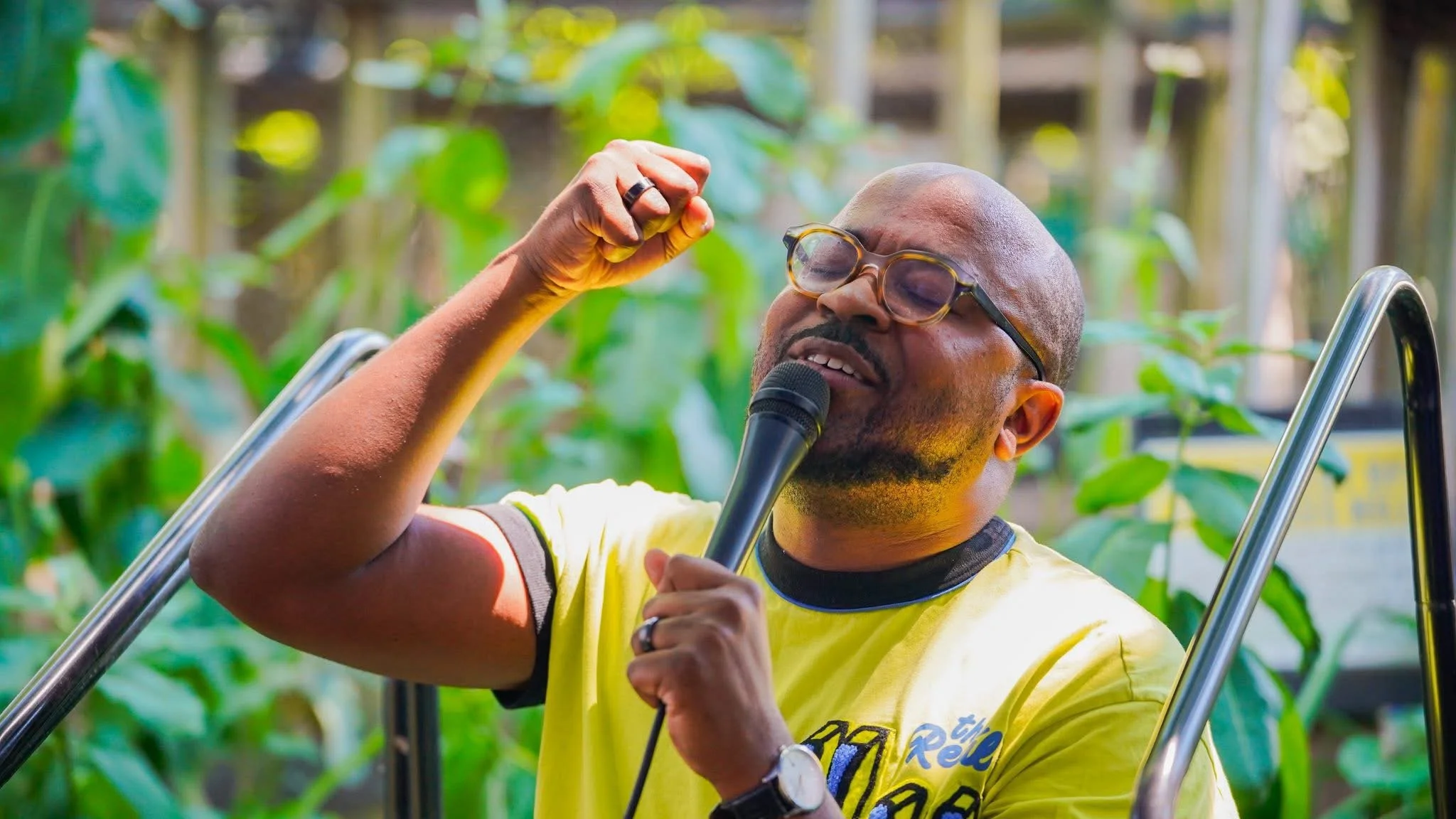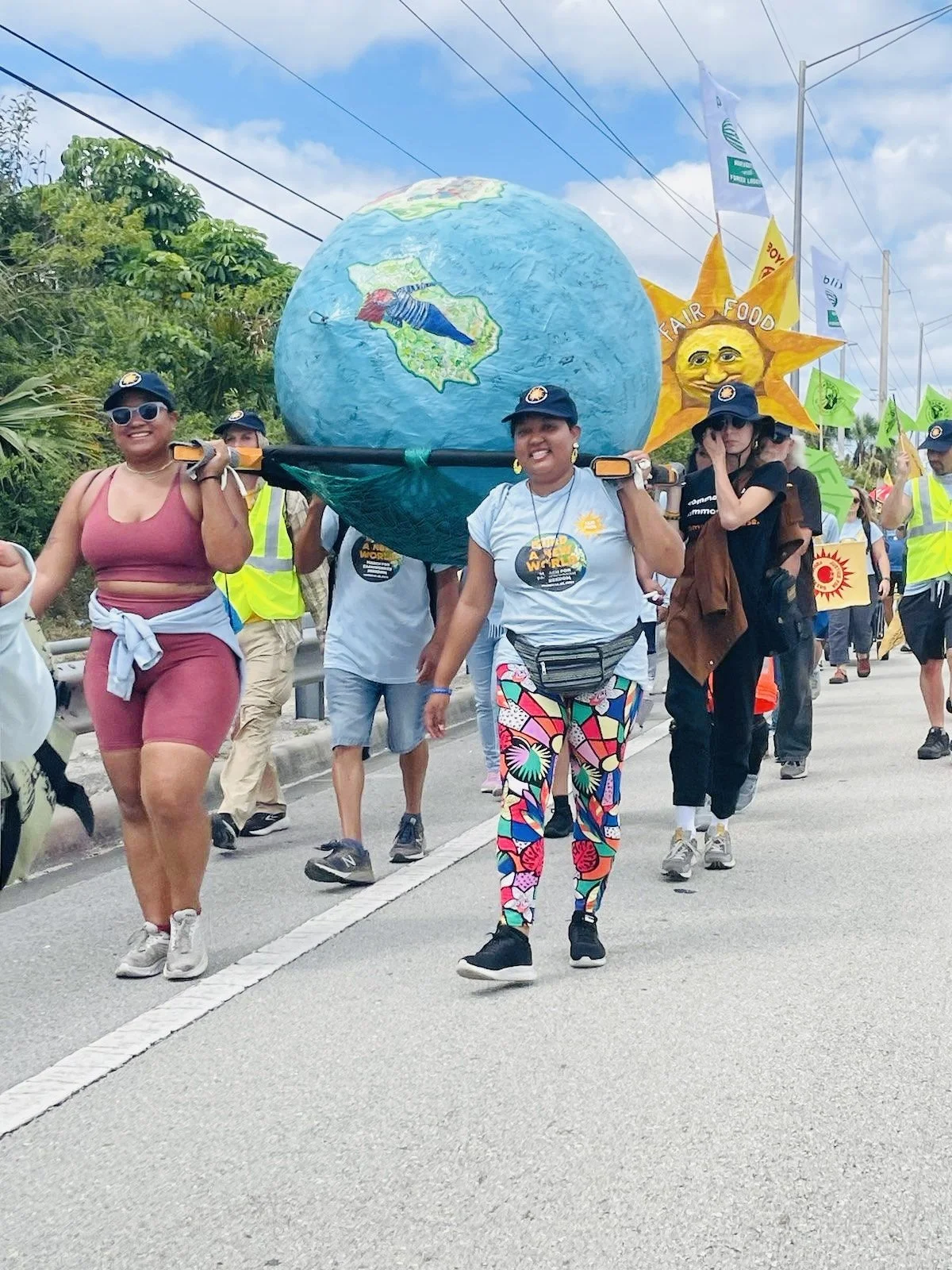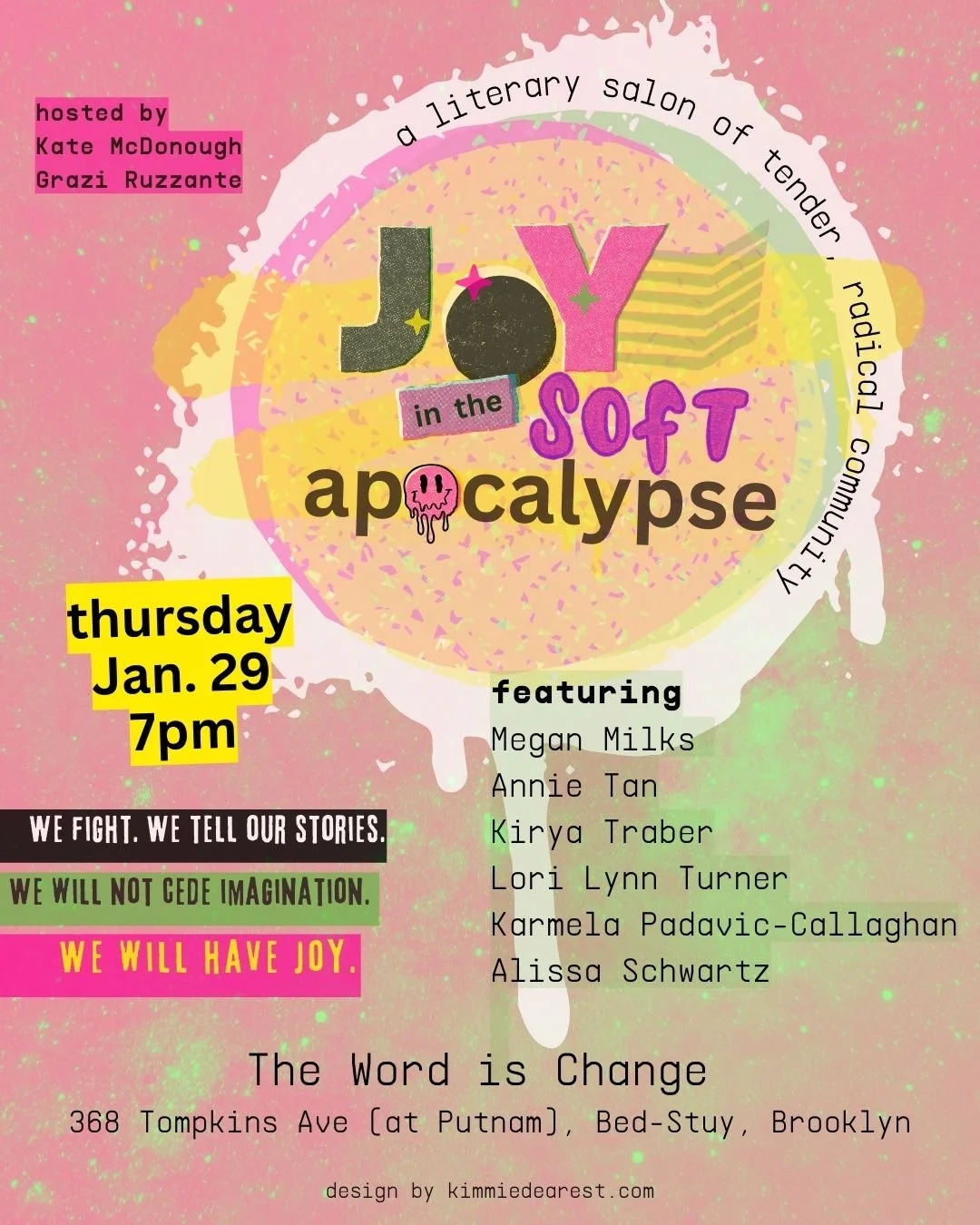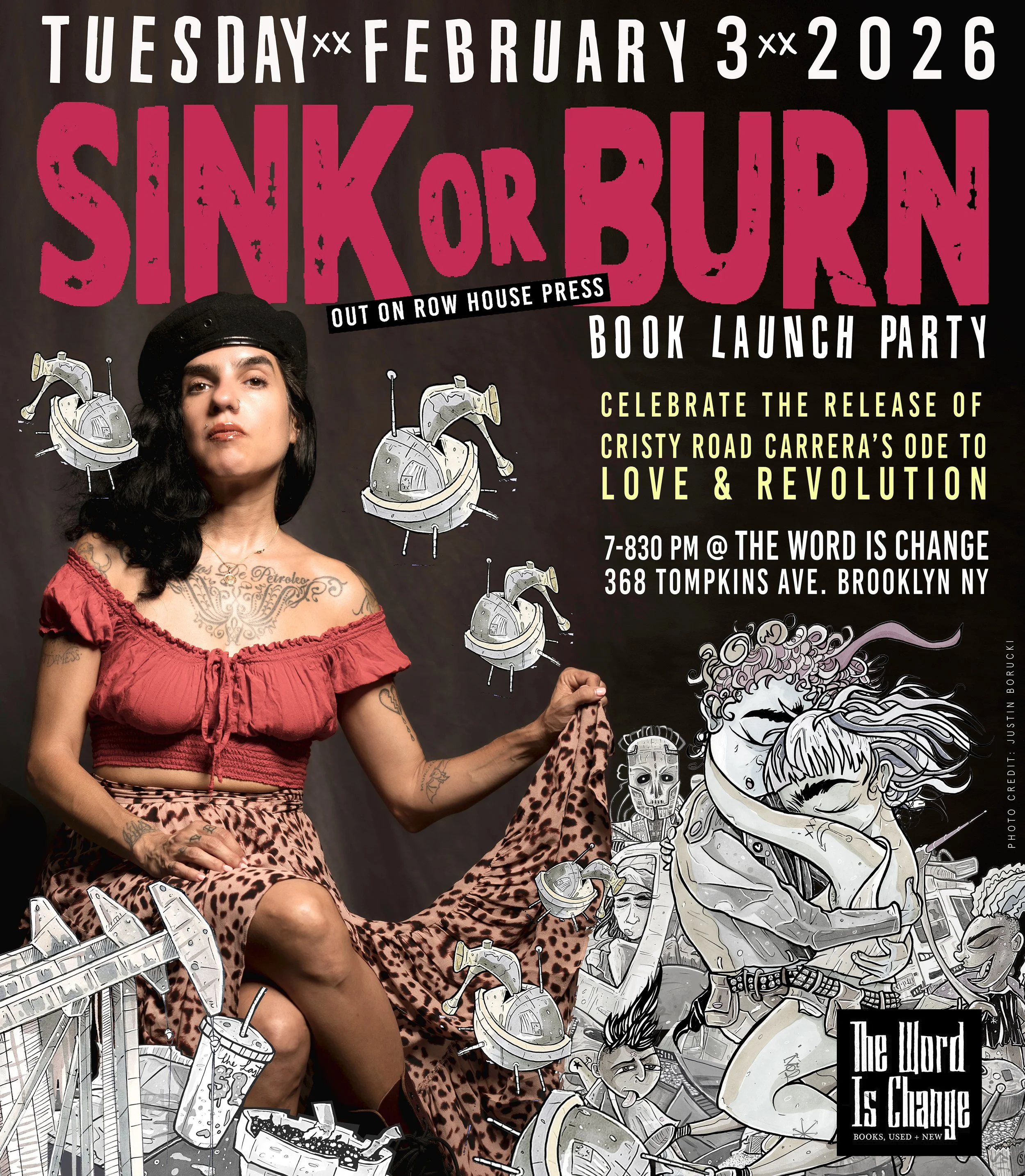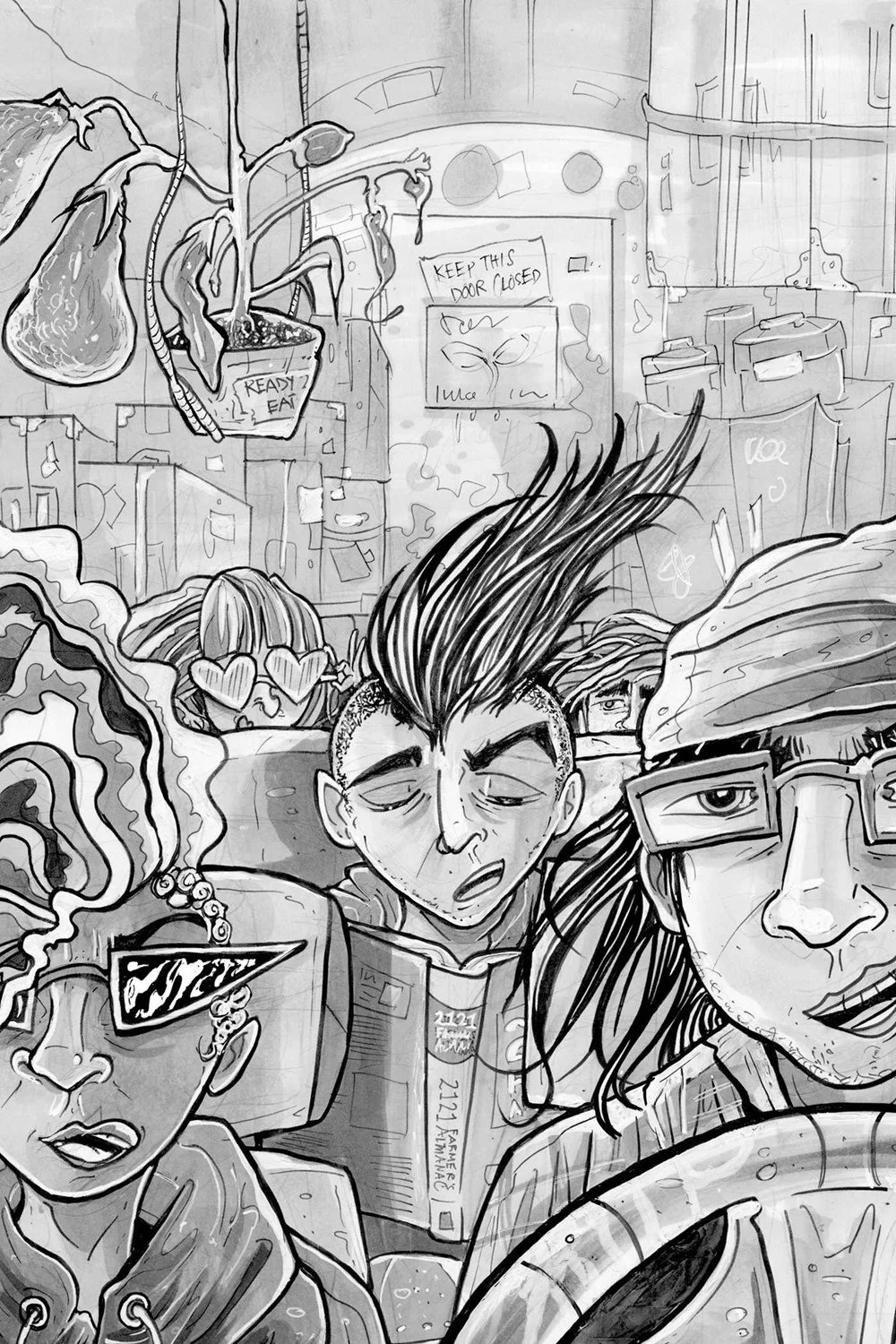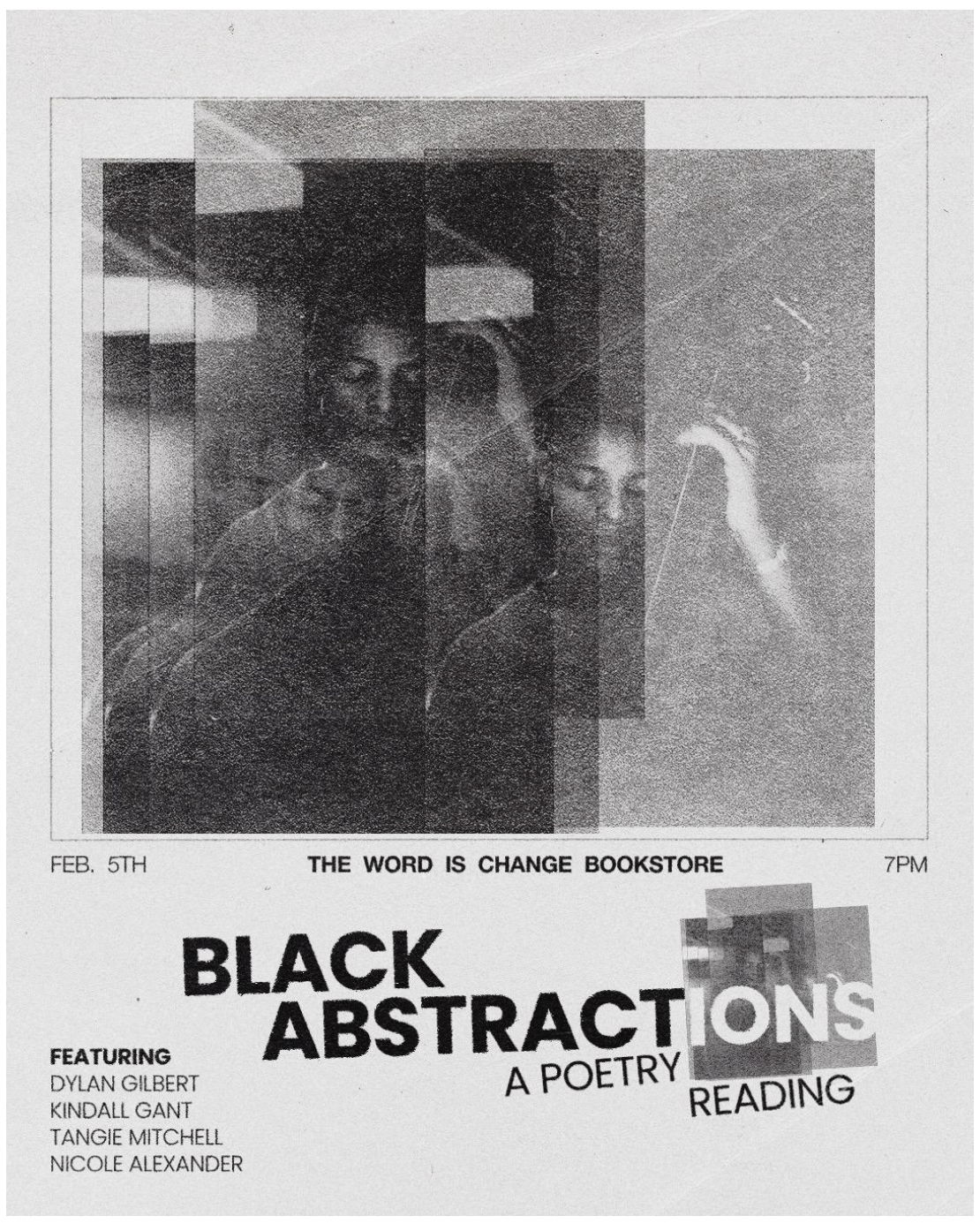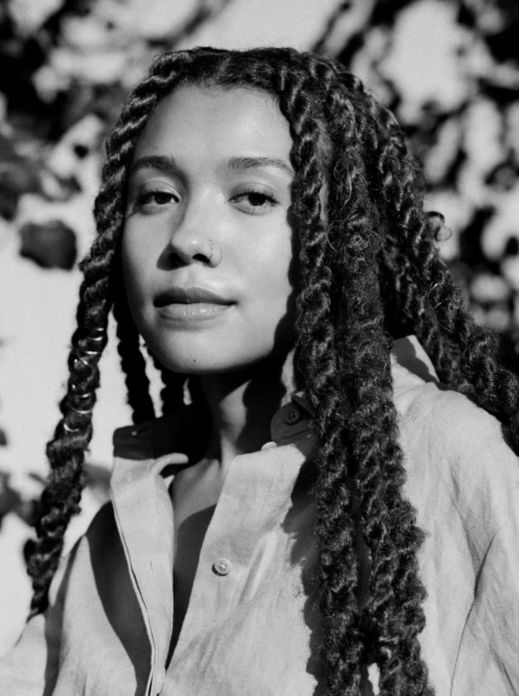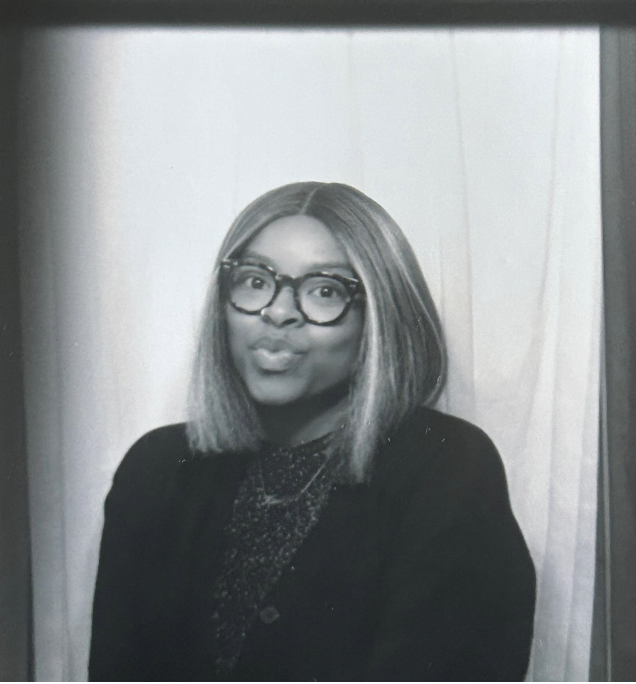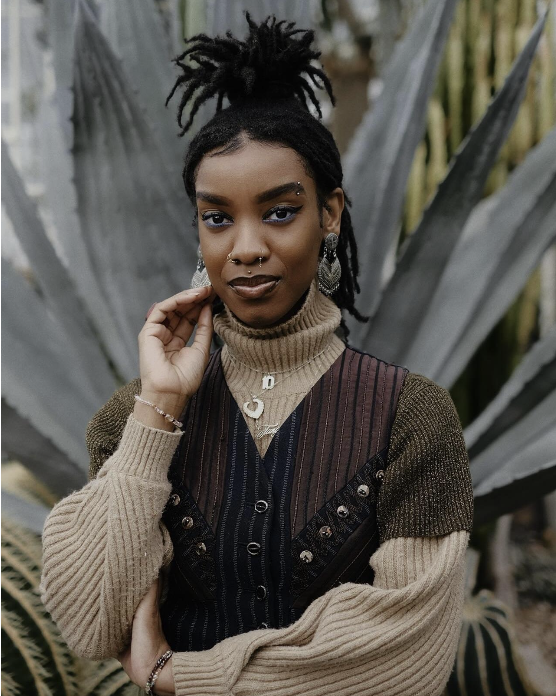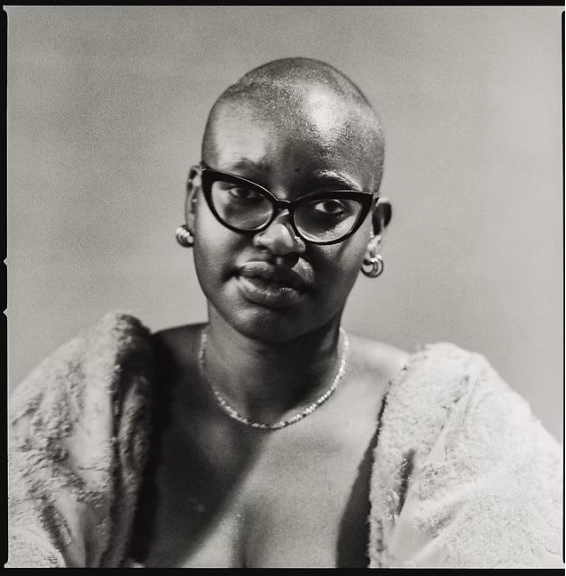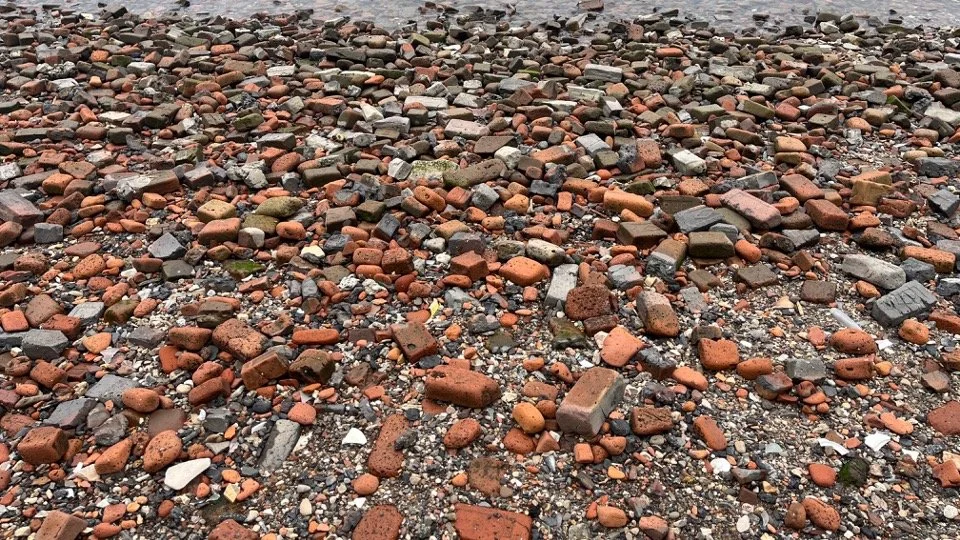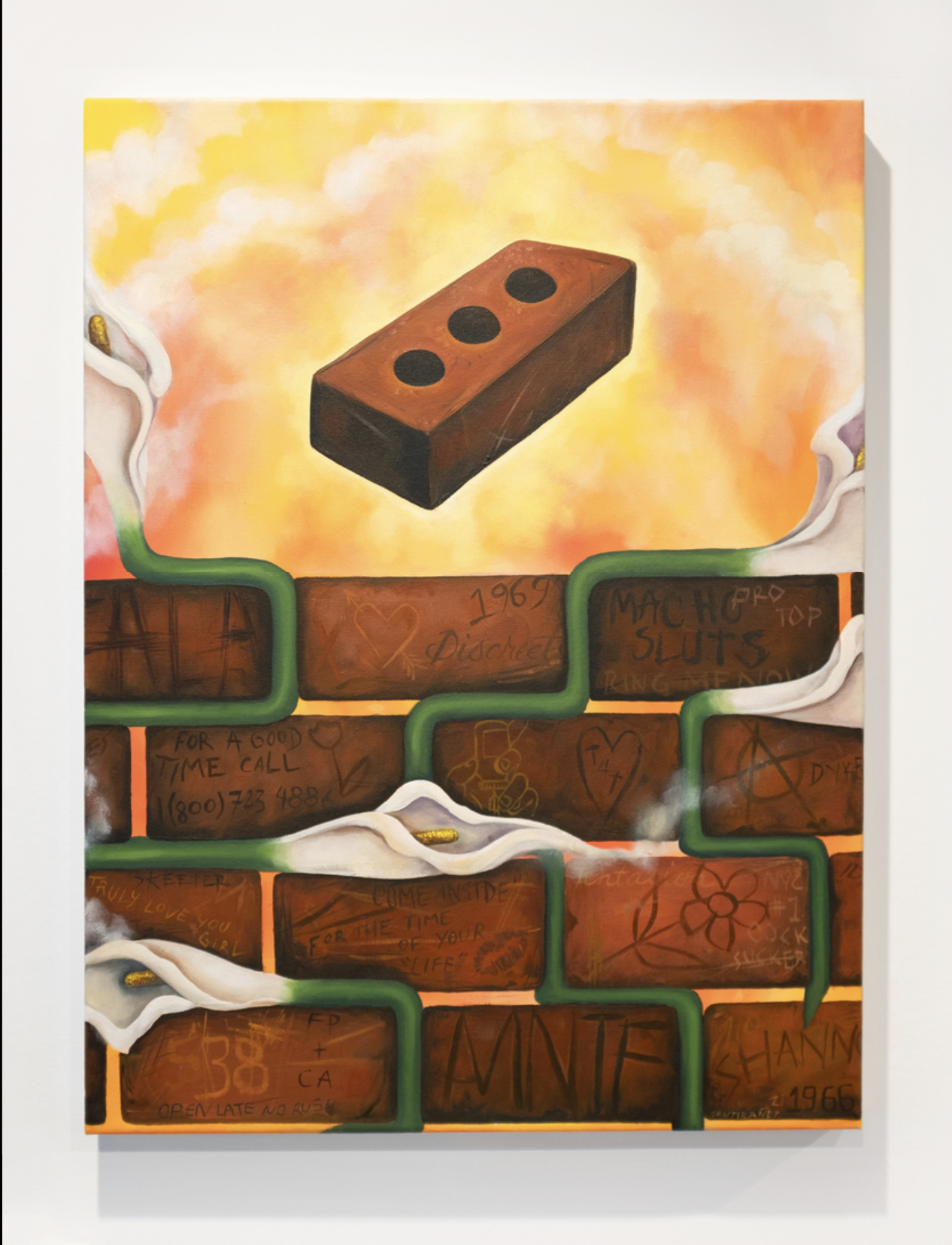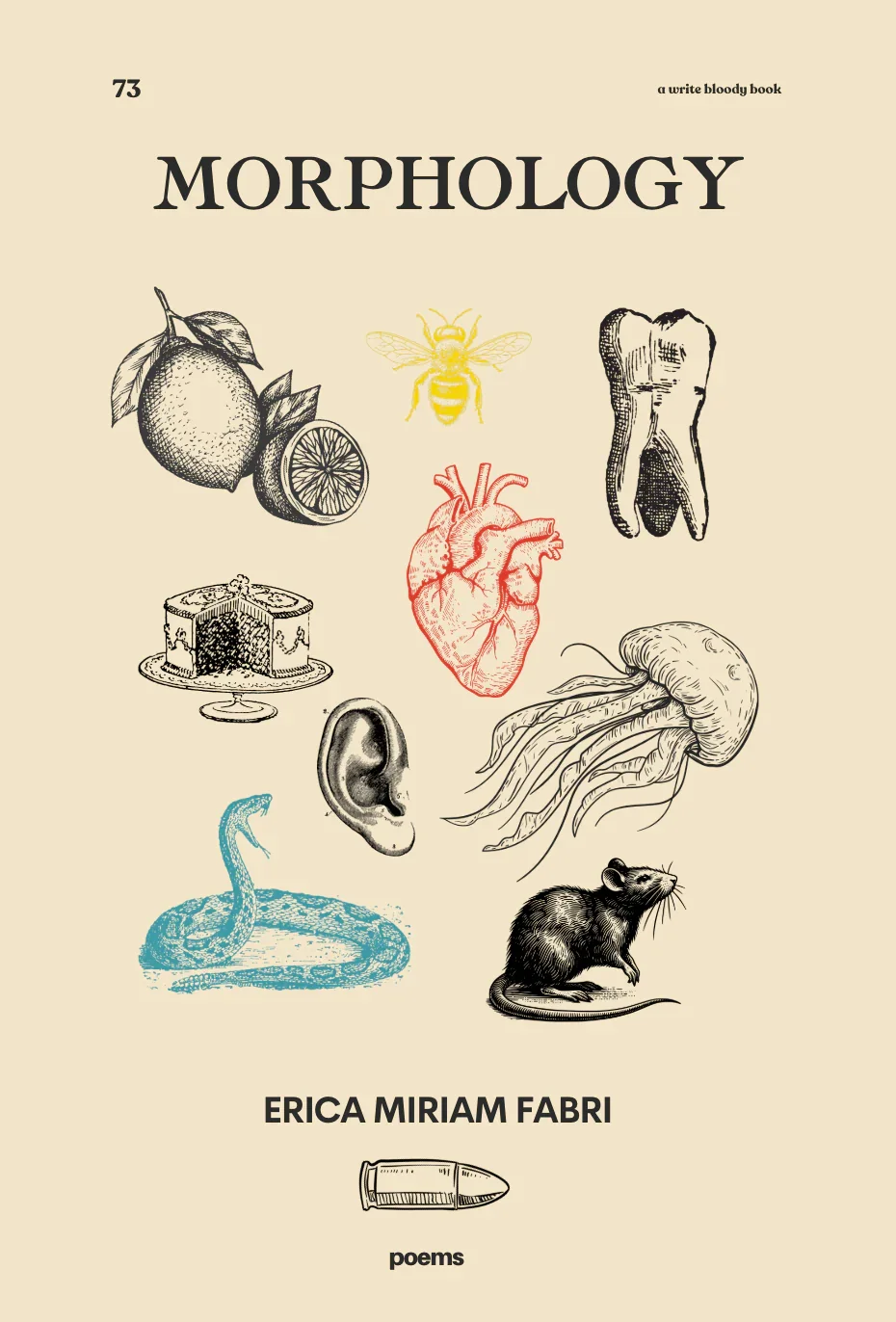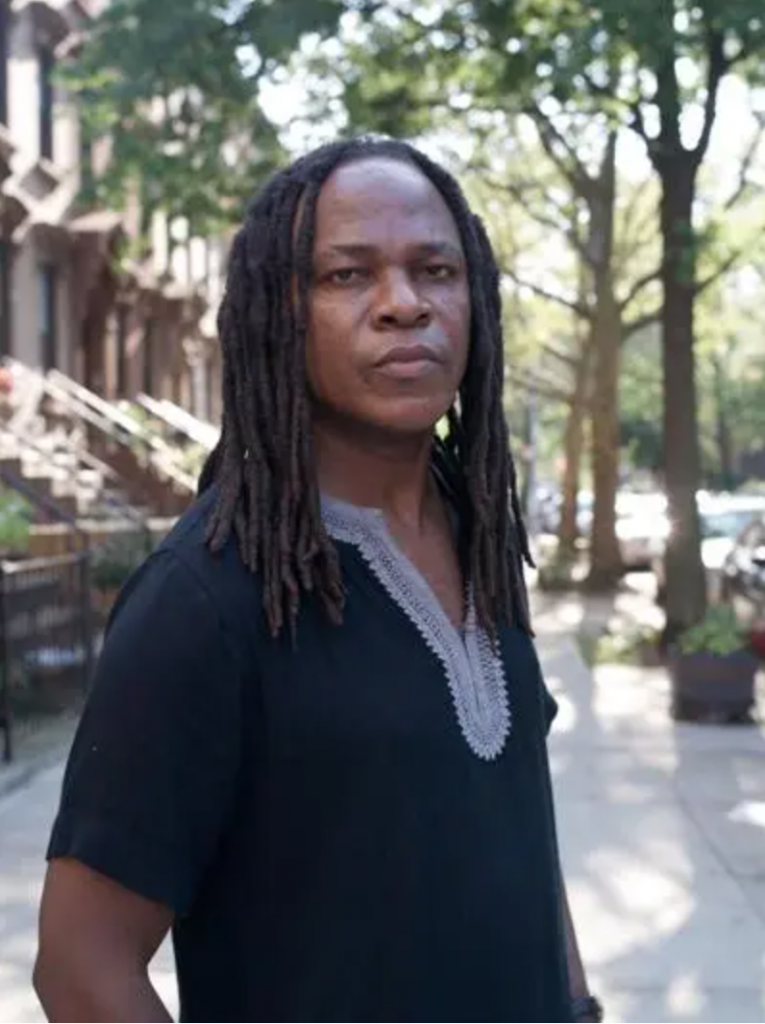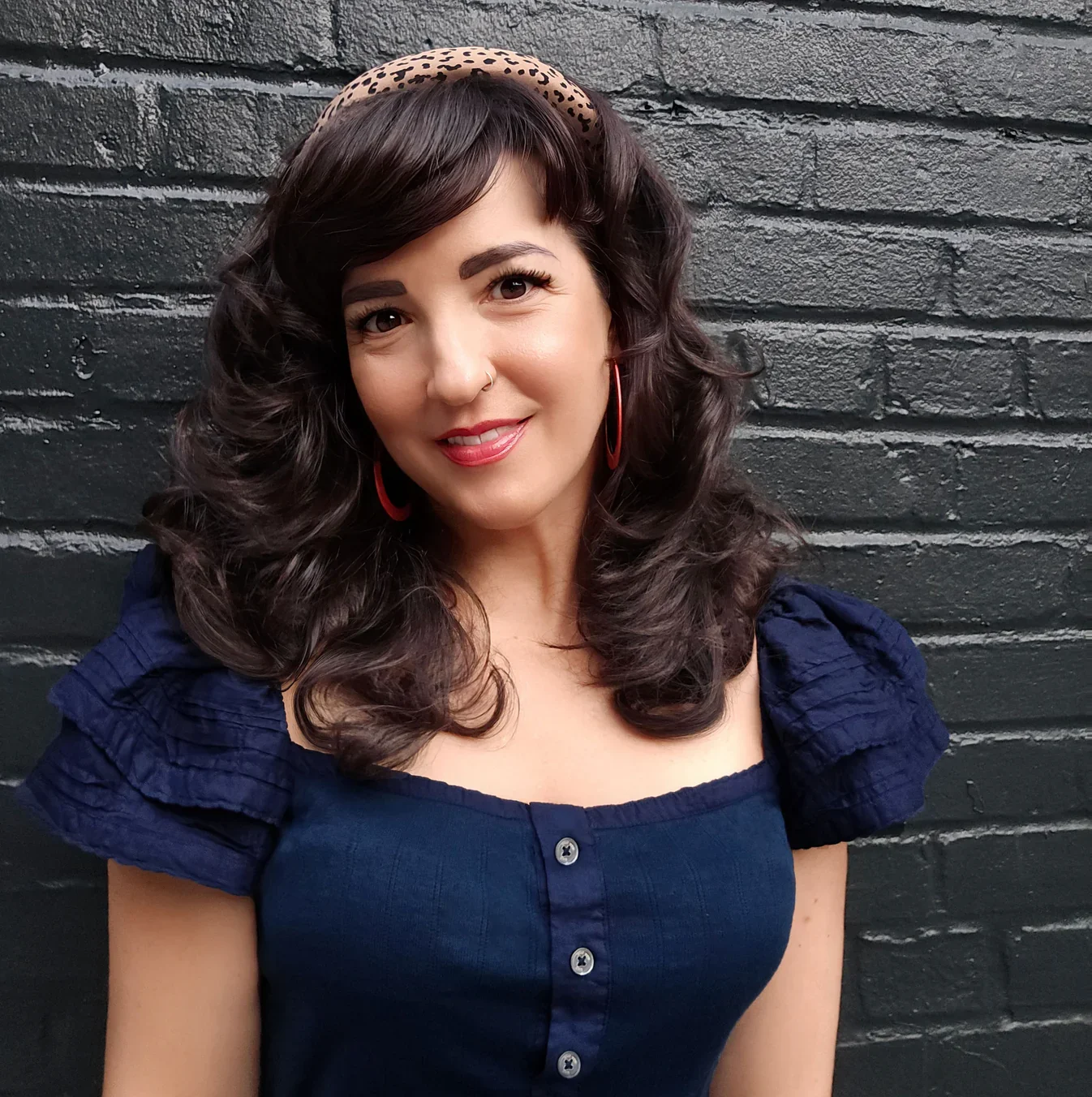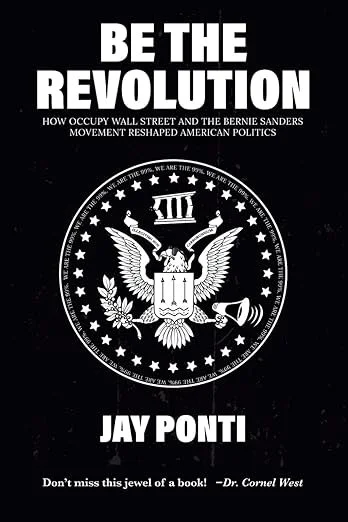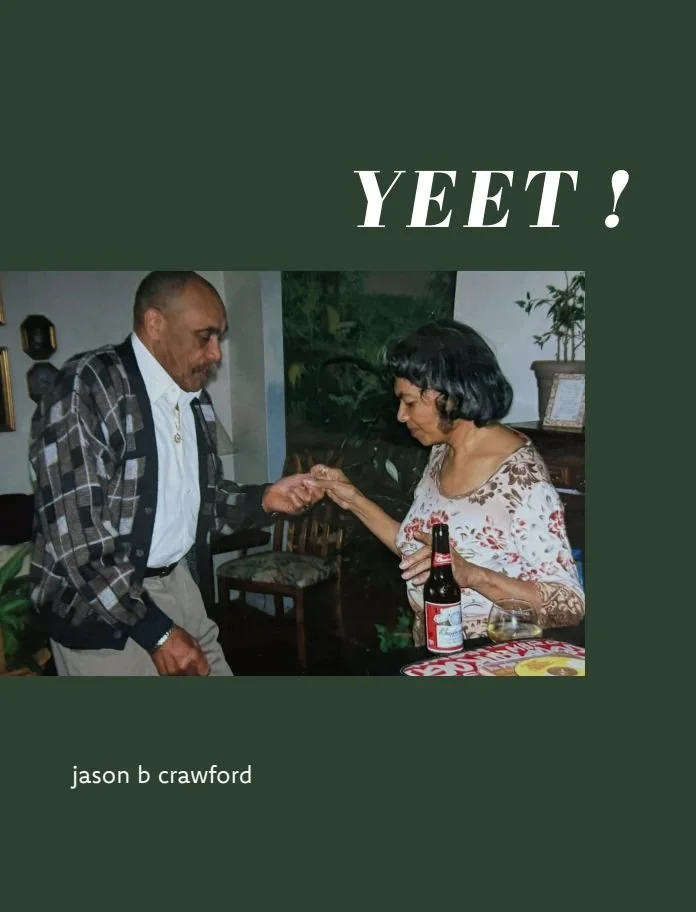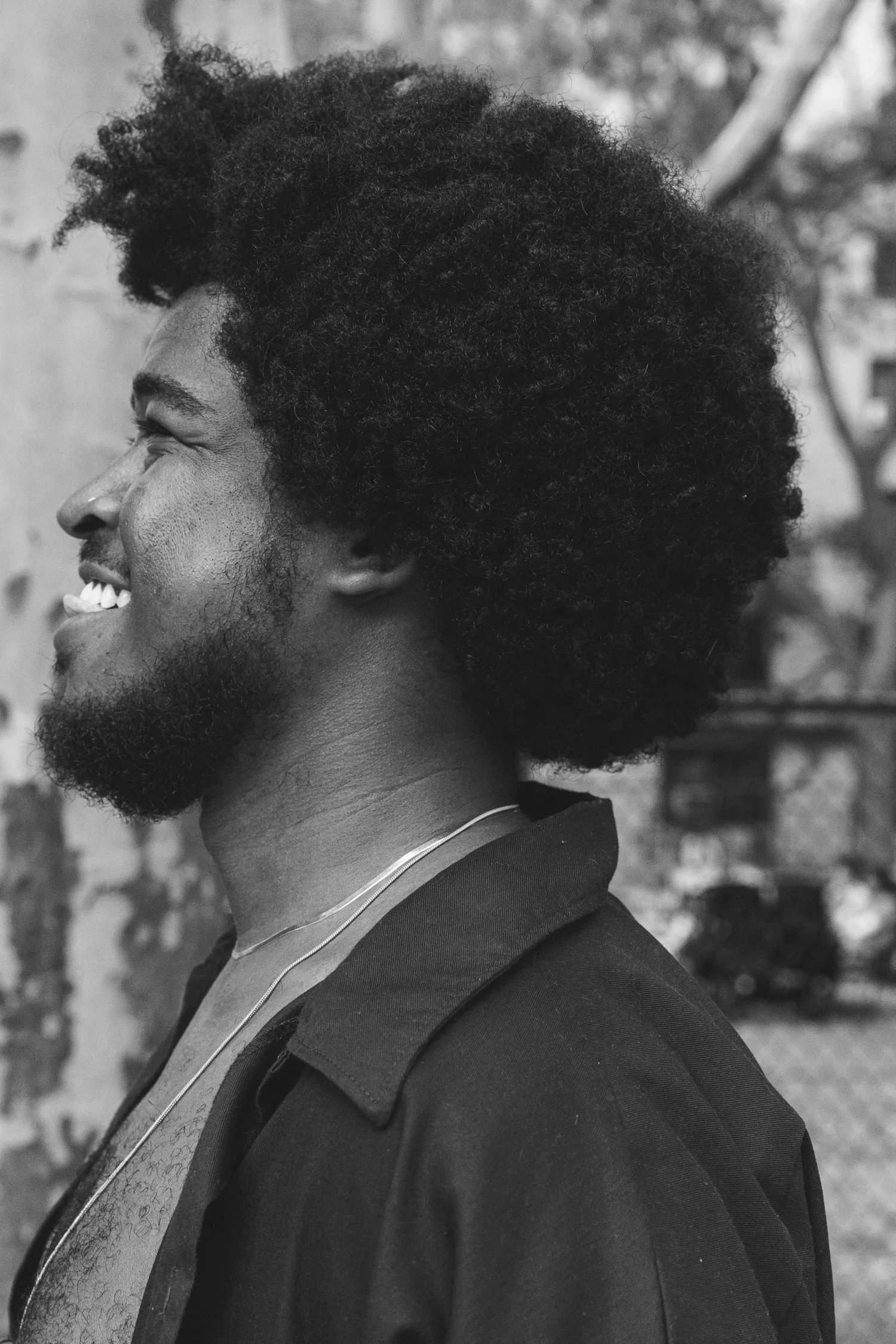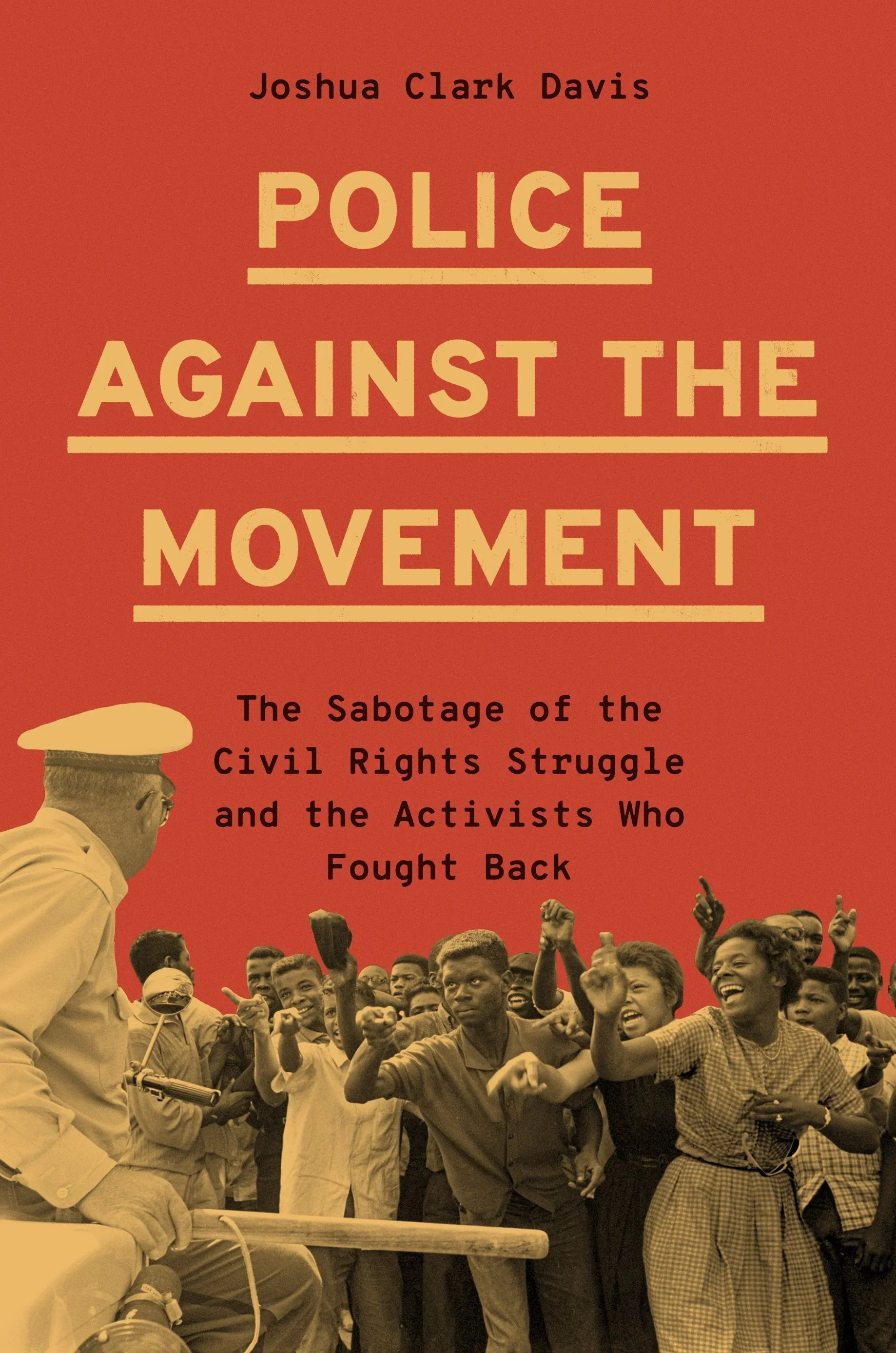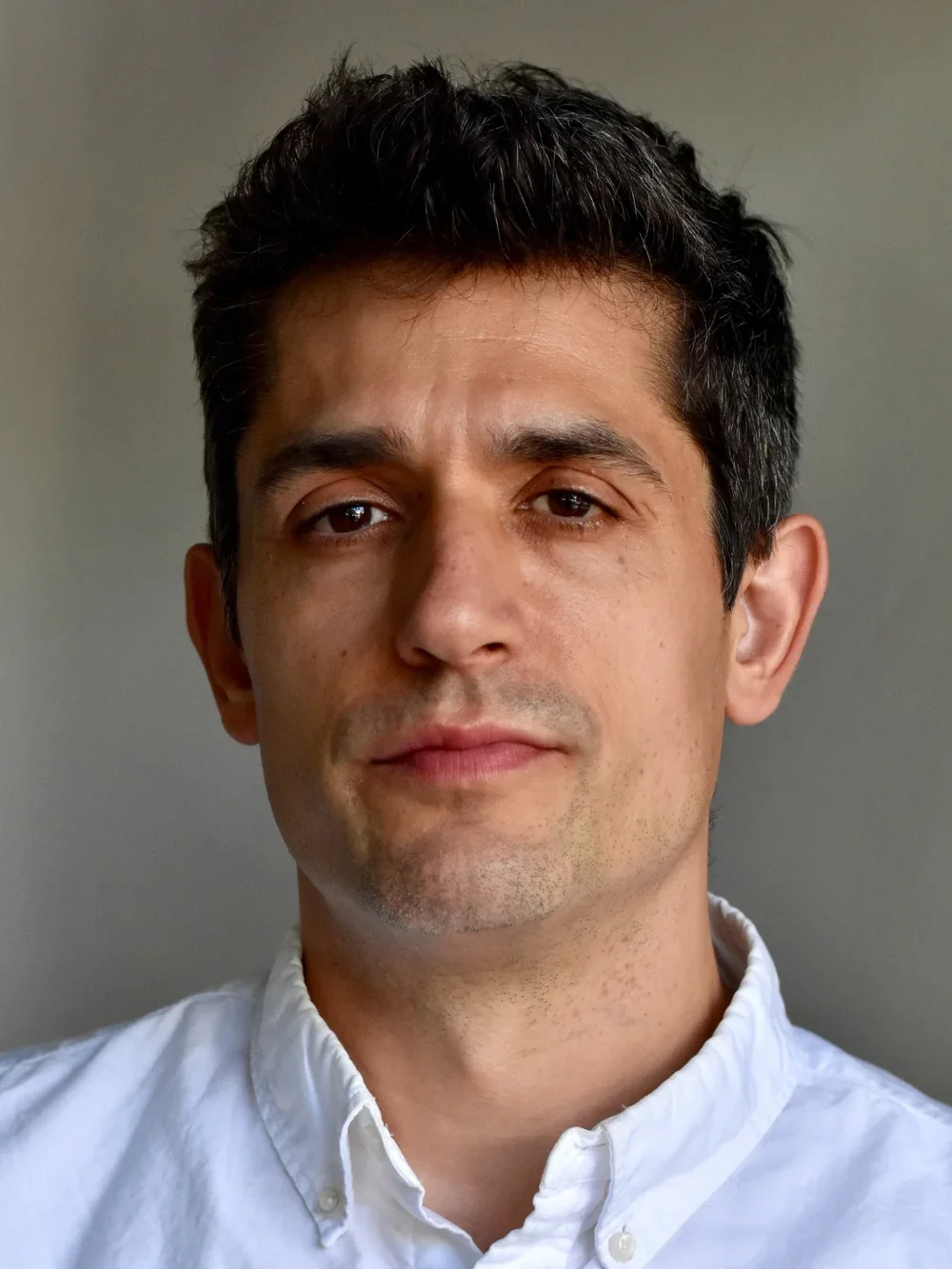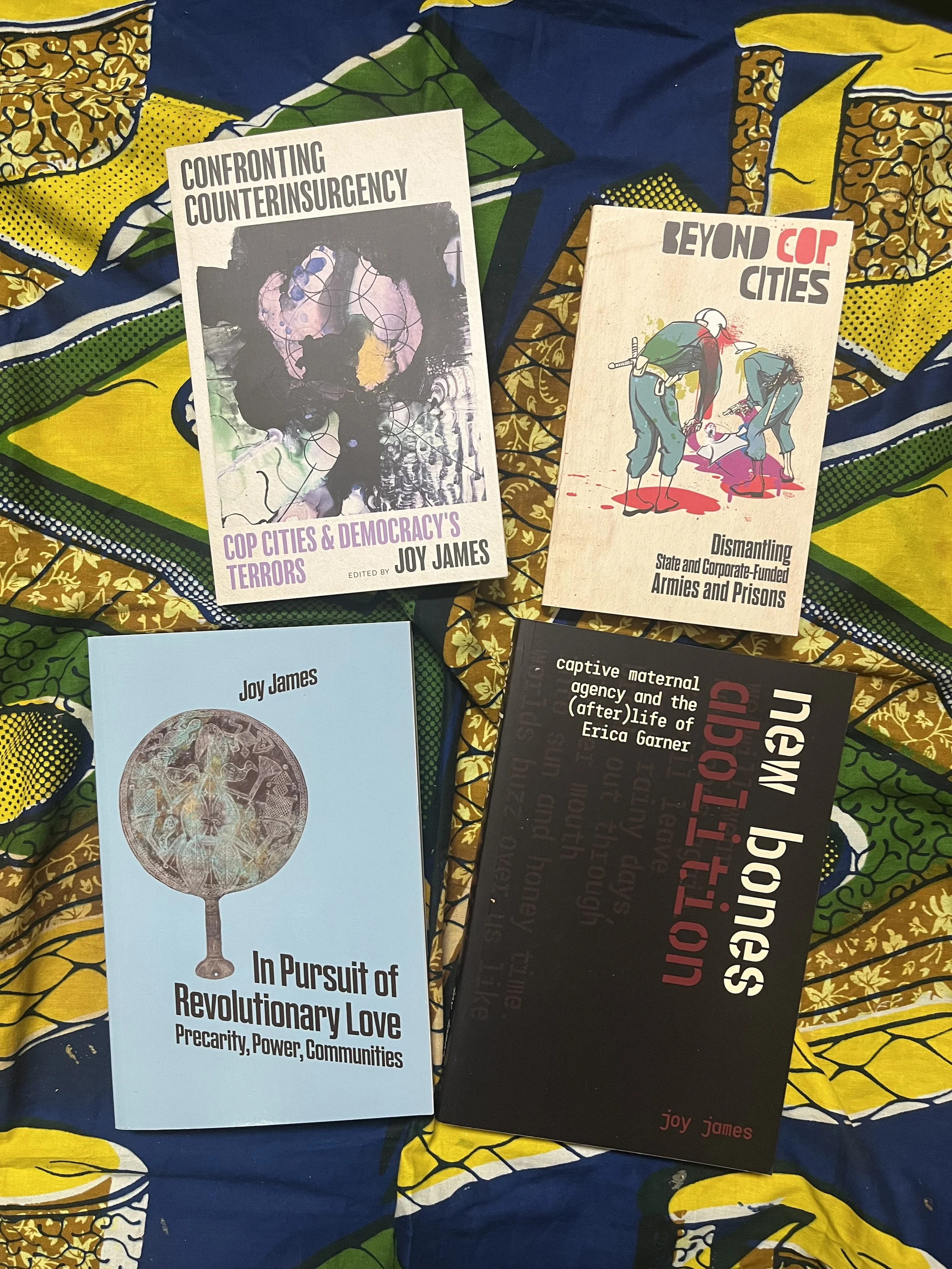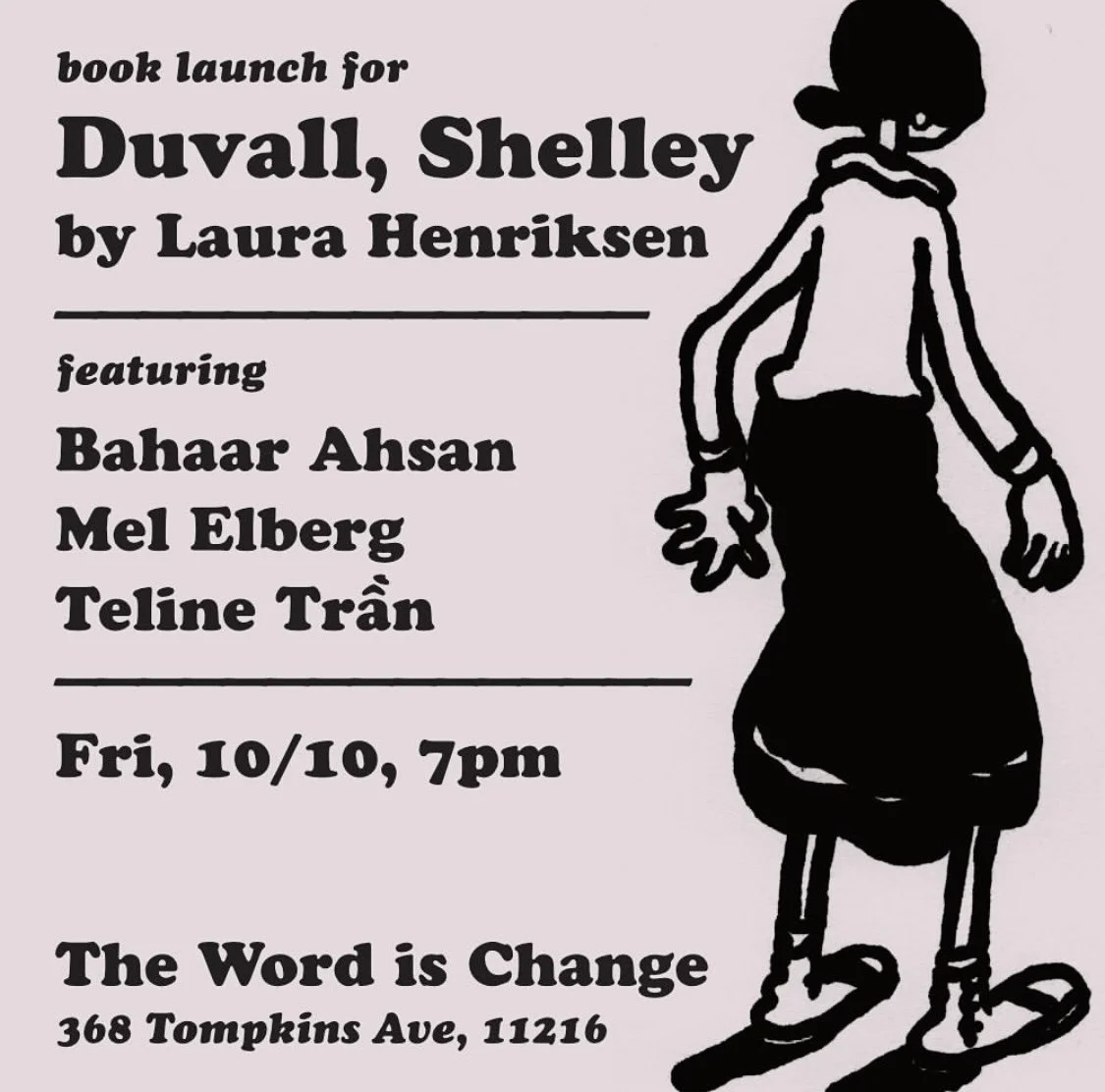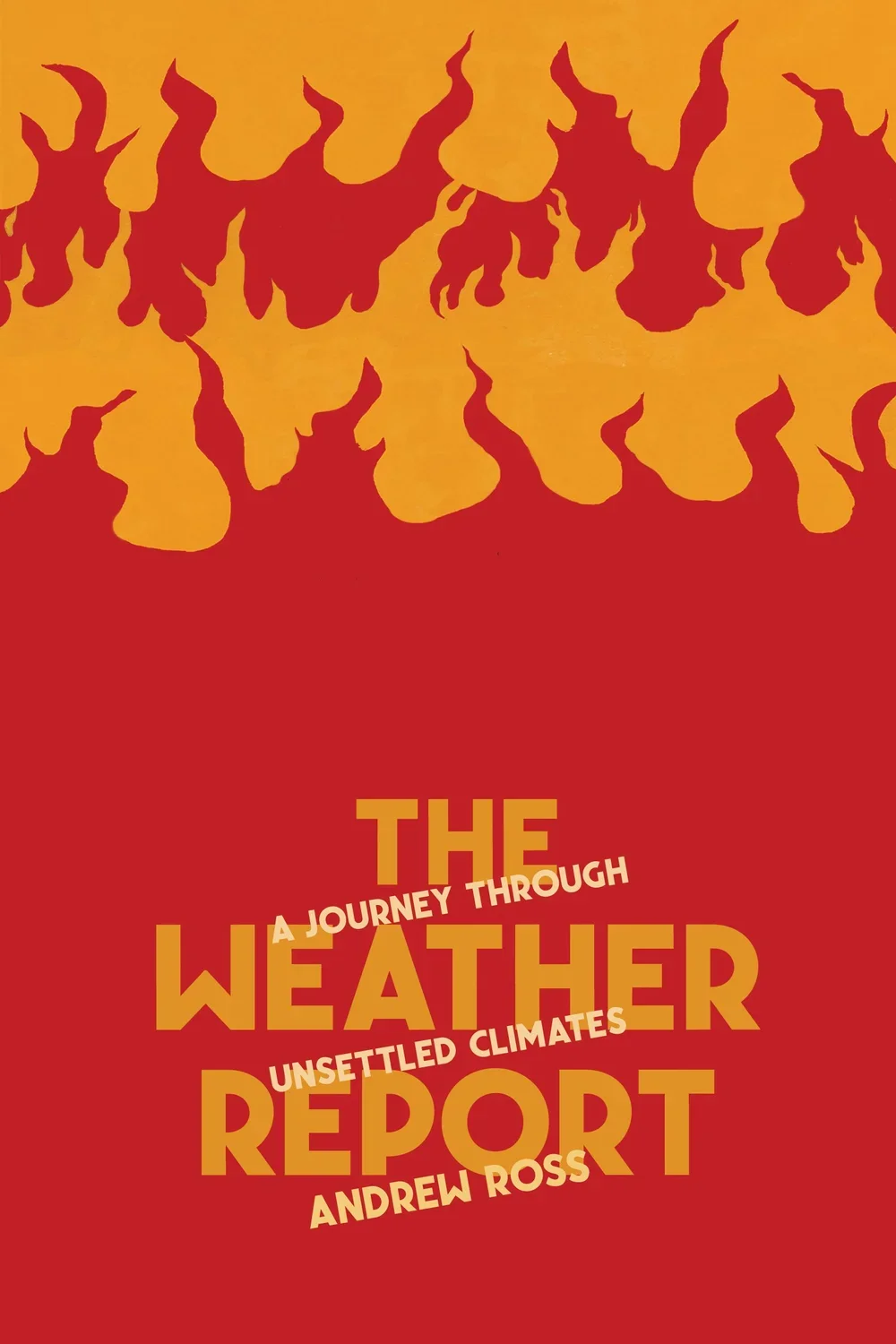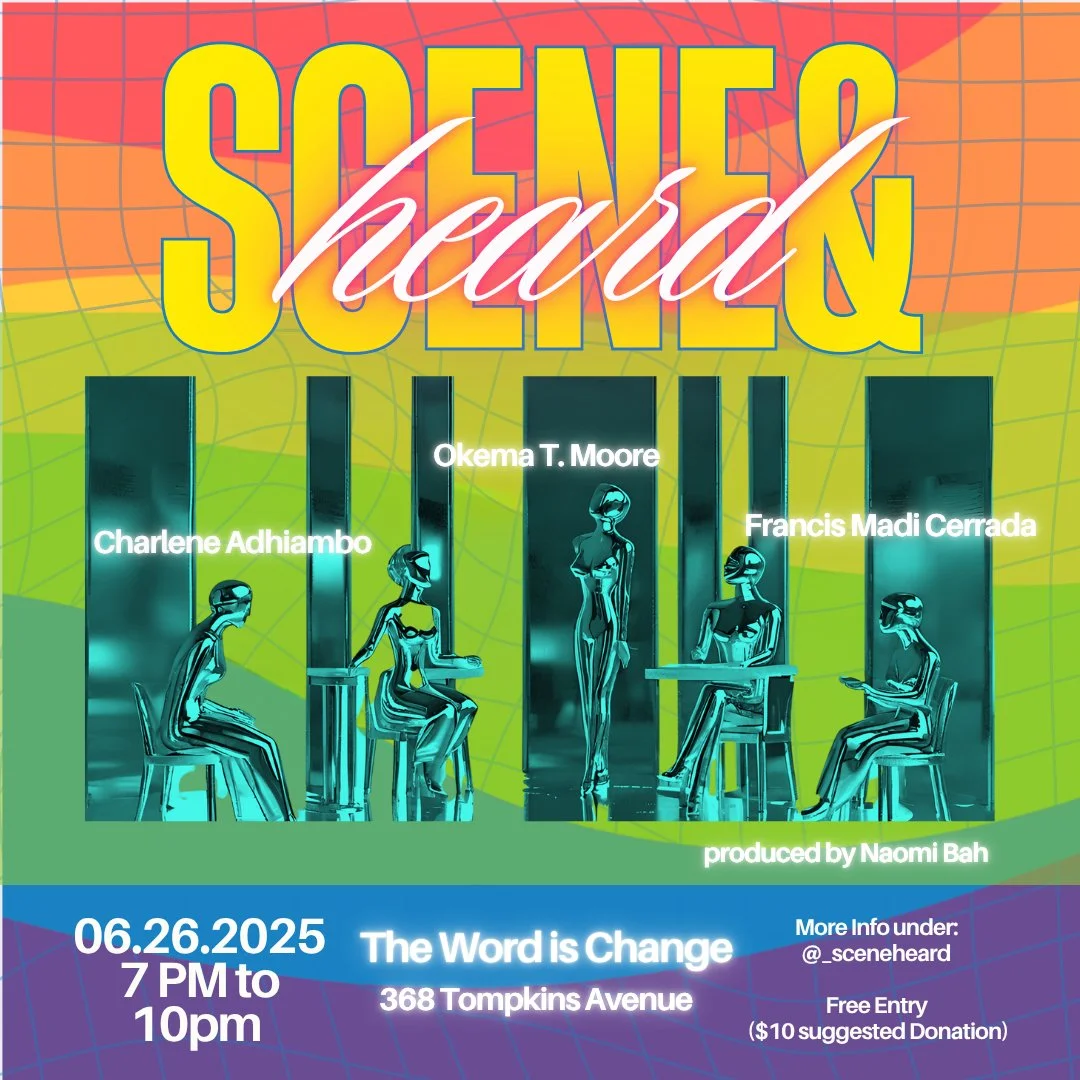We Pray Freedom: Prayers, Songs, and Organizing for Liberation
We Pray Freedom:
Prayers, Songs, and Organizing for Liberation
with Rev. Dr. Liz Theoharis, Dr. Charon Hribar, and contributors Steff Reed, Rev. Dr. Andrew Wilkes, and ana lara lopez
You're invited to join The Word is Change and the Kairos Center for this in-person book event for We Pray Freedom: Liturgies and Rituals from the Freedom Church of the Poor.
Together, we’ll gather for an evening of healing, remembrance, and collective action—lifting up the prayers, songs, and rituals that sustain our movements for justice.
A book of prayers, rituals, and liturgies that grows out of communities committed to abolishing poverty.
Prayer has long sustained movements for social change. Ritual gives shape to our desire for justice, and liturgy lends power to our work. In We Pray Freedom, we learn from activists and movement builders the songs, stories, and ritual practices that keep them going for the long haul. The Freedom Church of the Poor, called for by Dr. Martin Luther King Jr., has existed in many forms; today it includes laborers, poor folks, pastors, organizers, and others bound together by a conviction: It does not have to be this way.
Rev. Dr. Liz Theoharis
is a theologian, pastor, author, and anti poverty activist. She is the Executive Director of the Kairos Center for Religions, Rights, and Social Justice and Co-Chair of the Poor People’s Campaign: A National Call for Moral Revival. Rev. Dr. Theoharis has been organizing in poor and low-income communities for the past 30 years.
Dr. Charon Hribar
is a song leader, cultural organizer, and social ethicist. She serves as the director of cultural strategies for the Kairos Center and co-director of theomusicology and movement arts for the Poor People’s Campaign: A National Call for Moral Revival. With more than two decades of experience, Dr. Hribar empowers leaders to integrate rituals and arts into organizing efforts.
Steff Reed
is a musician, organizer, and scholar whose work bridges art, activism, and healing. A proud Black man and compassionate leader, he models emotional vulnerability as a form of strength and community power. With over 20 years of experience, Steff is a GRAMMY-nominated educator and Billboard-charting artist. Steff is currently a graduate student at Union Theological Seminary pursuing a Master of Sacred Theology (STM).
Dr. Rev. Andrew Wilkes
is the cofounding, colead pastor of Double Love Experience (DLE), a Brooklyn congregation dedicated to the liberating ministry of Jesus Christ. DLE advances God’s love and justice through worship, education, organizing, and radical discipleship. He is the author of Plenty Good Room and Psalms for Black Lives.
ana lara lopez
is the Coordinator of Freedom Church of the Poor Care & Engagement for the Kairos Center. Born in Antigua, Guatemala, Ana has lived in various places that shaped her worldview. She holds a BA in Sociology/Anthropology and an MDiv in Spiritual Care & Collective Liberation.
Joy in the Soft Apocalypse
It’s 2026, can we find some JOY in the Soft Apocalypse?
Turn up on January 29th as Megan Milks, Annie Tan, Kira Traber, Lori Lynn Turner, Karmela Padavic-Callaghan, and Alissa Schwartz guide us.
Hosted by Kate McDonough and Grazi Ruzzante
Sink or Burn with Cristy Road Carrera
Sink or Burn book launch
with Cristy Road Carrera
Celebrate the release of Cristy Road Carrera's ode to love & revolution.
In Sink or Burn, the year is 2121, and fascism has overthrown a once-thriving utopia. Amid the ashes of a fallen nation, Cheap Glitter—a queer, punk rock band—becomes the voice of resistance. As they tour across a fractured America, raising funds for the fight against a brutal regime, they navigate wildfires, sunken landscapes, and the terrifying laws of a collapsing society.
At the heart of their journey is CT, a lovelorn survivor whose romantic entanglement with a fellow bandmate—a survivor of a different war—complicates their quest for both personal healing and social revolution. As the band balances the weight of trauma with the urgency of their fight, they discover that love, however chaotic, may be their greatest weapon.
A punk rock anthem and a manifesto for the broken-hearted, Sink or Burn tells the story of a tortured artist’s evolution into a divine healer. Cristy Road Carrera, a punk rock icon and Latinx artist, weaves together individual survival with the broader struggle for liberation.
Eternal rabble rouser Cristy Road Carrera is a first generation Cuban-American artist, writer and musician. Blending anti-fascist principles with survival love stories—Road has spent over twenty-five years testifying to the beauty of the imperfect.
Her career began in 1996 with a self-published punk rock fanzine, sparking decades of illustrations for music, literature and social movements.
Forging an imprint in queer, feminist counter cultures with graphic memoirs, illustrated novels, and punk rock records; Carrera redefined her career in 2019 with the release of the Next World Tarot, a tarot card deck that envisions a world based on radical re-definitions of self-love and social justice.
Carrera has been fronting punk rock bands since her days of self-publishing fanzines. She currently performs her songs as Choked Up, making records and playing shows with the ancient punk rock ethos of passion before profit. Engaging with her world anywhere from Yale University to Bluestockings Bookstore, Carrera continues to thrive on the fringe of the mainstream, and the epicenter of revolution.
She is a gemini and works and lives in NYC and Miami.
Black Abstractions: A Poetry Reading
Black Abstractions:
A Poetry Reading
Join us for a night of poetry from an all Black femme lineup. Black abstractions refers to an expansiveness within Black poetics. On February 5th, you’ll have the opportunity to hear from four Black femme poets approaching the page with their own specificity, reminding us that Blackness—and its expressions in art—contains multitudes.
Dylan Gilbert (she/her)
is a Brooklyn based poet, editor, curator, and educator from the Midwest. She holds her MFA in creative writing from Columbia University and is a founding member of Saltlick Collective. Her work often deals with grief, girlhood, Blackness, and lineage. Dylan’s poems have appeared or are forthcoming in The Maine Review, Black Warrior Review, Plumwood Mountain Journal, Salt Hill Journal, and elsewhere.
Kindall Gant (she/they)
is a Black femme interdisciplinary poet and New Orleans native based in Brooklyn. She experiments with visual storytelling as liberation bringing poems into conversation with expressive forms like film, visual art, music and photography. They have received support from Cave Canem, the Poetry Foundation, MASS MoCA, the Saltonstall Foundation, the Watering Hole, Studio Museum in Harlem, the Guggenheim, and Ma’s House among other arts institutions. Her poetry has been nominated for a Pushcart Prize, Best of the Net and appears in Seedlings, TORCH, 1619 Speaks, Brooklyn Poets, The Poetry Society of New York’s Milk Press, and Obsidian. Their book The Harlem Table is forthcoming from Phaidon.
Tangie Mitchell (she/her)
is a poet from North Carolina. Her work centers personal and collective histories of the Black American South and has been featured in The Poetry Project Newsletter, Obsidian: Literature and Arts in the African Diaspora, No, Dear, Poetry Wales, Mosaic and more. She is a 2024 Poetry Project Emerge-Surface-Be Fellow, a Water Hole fellow, and an alum of the UK-based Obsidian Foundation.
Nicole Alexander (she/her)
is a poetess and educator based in Brooklyn. She graduated from Syracuse University in 2020, earning a BA in English and textual studies with a concentration in creative writing. During the warmer months, Nicole writes personalized poems for strangers in NYC parks for her social art project, A Poem, From Me To You. Her chapbook, Why I Love Dreaming, was released in 2024.
Upcoming Events (& past events)
If you’re seeing this we have some exciting events in the works, but aren’t ready to share all the details.
Sign up for our email list and follow us on instagram to keep up on all that’s happening here.
Keep scrolling to see what you missed or remind yourself of who spoke at an event you went to.
Earthen Weapon: Brick Threats and Promises with Tamara Santibañez
Earthen Weapon:
Brick Threats and Promises
Tamara Santibañez
Artist Tamara Santibañez presents an incomplete genealogy of the brick in the radical political imagination, from the "first brick" at Stonewall, to the mysterious pallets of bricks during 2020's George Floyd uprisings, to the "reverse bricklaying" of students at Gaza solidarity encampments on campus. Discussing their own work as an oral historian and sculptor as well as the work of other artists using brick, their talk will offer a series of brick vignettes and considerations from firsthand encounters, archival research, rumors, and gossip.
Offering the brick as a way of seeing, Santibañez will discuss the paradox of the brick and brick wall, the invitations and limitations of a solo brick versus a brick in formation, and ask: What do you know of bricks? Do you know a brick when you hear it? Can you feel a brick as it's happening?
Considering the current flu and nurses strike this is a masks required event. If you don’t have one they will be provided. If you are feeling sick please skip this one and get better soon.
Tamara Santibañez is an interdisciplinary artist and oral historian based in Brooklyn, New York.
Their practice employs storytelling, archival research, tattooing, and craft-based sculptural techniques to interrogate the ways in which hostile architectures, borders, and coded languages are re/produced and re/interpreted on the body. They are the author of Could This Be Magic? Tattooing as Liberation Workand the poetry chapbook Memory Lane.
Thanks to The Laundromat Project’s Create & Connect micro-grant fund that seeds and supports creative projects by cultural practitioners, community builders, organizers, and makers living in our home of Bedford-Stuyvesant, Brooklyn.
Uche Nduka & Erica Miriam Fabri
To Umber & Morphology poetry reading and book(s) launch
with Uche Nduka and Erica Miriam Fabri
We are pleased to welcome Uche Nduka, as he returns to Brooklyn with a new collections of poems To Umber, and Erica Miriam Fabri for her new collection Morphology
“‘Uche Nduka has long established himself as a master of the short, gnomic, aphoristic poem. In To Umber, he has woven strings of three- and four-line bursts of verbal melody into long tapestries of urban music. An “archaeologist at the mall,” “wary of world-weariness,” Nduka braids florilegia of observation and longing, jazzy micro-solos of dismay, desire, and delight. These poems are snappy, sassy, veering from high theory to low innuendo; they are shot through with a constant dark undercurrent of the crisis of the body politic, of the world as a whole—but warm with “a wild sort of tenderness,” alive with joy at “the fullness / Of the music of fuchsia.”
—Mark Scroggins
For Uche Nduka “the act of writing is an invitation to inquiry, argument, communion. Poetry is woven into the very fabric of the sensuous, the emotional, the political. My work leans into wonder but goes beyond just beauty. I let the poem dance in the light and shadow of all kinds of truth and experience. For me, the keyword is justice. The poems in To Umber combat stoic indifference and silence. I believe that the work of a cosmic lover is never over. In me the poetry of revolt has found its writer.”
"Where love meets language—a stunning exploration of bodies, both present and vanished"
Morphology, by definition, is the study of the forms of words and bodies. In her second book, Erica Miriam Fabri uses the formation of words—molded into poems—to celebrate and mourn various forms of bodies. The bodies featured as main characters in this collection include lovers, family members, children, ghosts, rats, jellyfish, skeletons, and snakes. While this book of poetry is set mostly in New York City, it also journeys to far-flung destinations such as outer space, the deep sea, and the afterlife.
Uche Nduka is a poet-pilgrim, collagist, and essayist presently living in New York City. He is the author of 14 volumes of poems of which the latest are Scissorwork (Roof Books, 2022) and Bainbridge Island Notebook (Roof Books, 2023). A NYSCA/NYFA Artist Fellow in Poetry, his writing has been translated into Italian, Finnish, Turkish, Arabic, Dutch, German, Serbo-Croat, Romanian. His essays on music, poetry, mortality, politics, and travel have appeared in various online and print outlets. He teaches at the New School’s Eugene Lang College and Queens College-CUNY.
Erica Miriam Fabri is a poet and the author of two books: Morphology (Write Bloody Publishing, 2025) and Dialect of a Skirt (Hanging Loose Press, 2010). She has been widely published and worked on projects as a writer or editor for The New York Knicks, Urban Word NYC, HBO, and Nickelodeon Television. She teaches at Pace University and The College of Staten Island. She is also a Freelance Photographer, a New Yorker, and a Mama.
Be the Revolution: Jay Ponti
Be The Revolution
Book Reading and Discussion with Jay Ponti
Please join us December 28th for an evening of conversation, community, and movement-building.
The event will feature a reading from Be The Revolution: How Occupy Wall Street and the Bernie Sanders Movement Reshaped American Politics, followed by a panel discussion focusing on “Why the left keeps losing, and what it will take to defeat fascism and stop the climate apocalypse.”
in discussion with Stanley Fritz (Vera Institute of Justice) and Antonio “Tony” Rosario (Teamsters Local 804)
About the Event:
Author Jay Ponti—organizer, impact producer, and strategist—will read from his debut book, which has been praised by Noam Chomsky, Cornel West, Mark Ruffalo, and other leading voices in politics, culture, and activism.
Jay has been deeply involved in frontline movements including Occupy Wall Street, Standing Rock, and the #BankExit fossil fuel divestment campaign. He served as a top surrogate organizer for Bernie Sanders’s 2016 and 2020 presidential campaigns and currently is the Director of Campaigns with Turn Left PAC. In 2024, he directed Leonardo DiCaprio’s SaveYourVote.org initiative to combat voter suppression targeting Black and Brown communities in swing states.
Following the reading, Jay will be joined by local organizers and movement leaders to discuss the path forward for the left, examining strategies for building real power, rebuilding solidarity across movements, and winning against fascism, neoliberalism, and climate collapse.
Panelists:
Stanley Fritz is the Director of State and Local Policy at the Vera Institute of Justice. In his role, Stan supports initiatives across the Institute in building and executing strategic campaigns to pass policies aiming to reduce the harms of the criminal legal and immigration systems nationwide.
Before joining Vera in 2023, Stanley spent seven years at Citizen Action of New York as Political and Campaign Director. At Citizen Action, he served as the organization’s chief lobbyist and spokesperson and led its local, state, and federal endorsement processes.
In addition to his work at Vera, Stan authors a newsletter titled Let’s Not Be Trash, which seeks to generate discussions with men about patriarchy, race, and politics through essays, podcasts, and music.
Antonio “Tony” Rosario
Lead Organizer, Teamsters Local 804
Anthony “Tony” Rosario is a veteran Teamsters organizer based in New York and serves as the New York market lead, not the entire Northeast. He has more than three decades in the labor movement, with 31 years of organizing experience.
Tony began as a UPS worker and was a striker in the historic 1997 UPS strike at just 22 years old. He later became a UPS driver and then a full-time organizer. He was a leader in the landmark 2023 UPS contract campaign and is now helping lead the charge to organize Amazon delivery workers in New York City.
He is an active member of Teamsters for a Democratic Union and continues to play a key role in major union organizing campaigns across the region.
The evening will include a live Q&A and will close with a brief open share-out. Local activists are invited to share about their organizing efforts, campaigns, and ways to get involved.
★ PRAISE FOR BE THE REVOLUTION ★
“Be The Revolution offers important insights into some of the most significant developments in modern America, based on intimate knowledge and direct participation.”
— Noam Chomsky
“We should thank Jay for his life’s work. As an organizer, he is a wonder to watch in action. This accounting of events of the last ten years is a profound and seismic piece of American political and cultural history that has gone all but unnoticed in the mainstream. Be The Revolution is not about a battle of right or left, but the battle for humanity and the natural world. The timing of this book couldn’t be more right, nor the message more on point. Ken Burns should do a doc on this!”
— Mark Ruffalo
“Jay Ponti is a legendary long-distance revolutionary thinker and activist whose vision, analysis, and courage is a beacon of hope in our bleak times. Don’t miss this jewel of a book!”
— Dr. Cornel West
“Wopila (Thank you) for writing the blow-by-blow actions of the war we faced at the Oceti Sakowin Camp (Standing Rock). Jay Ponti had great influence on the two Declarations written at Oceti Sakowin, particularly the Divestment Treaty among Nations. The First Declaration defies the Doctrine of Discovery and illegal actions used by it. The second called for divestment by countries from fossil fuels, especially by DAPL and all other oil corporations. Thank you for your written words.”
— Phyllis Young, American Indian Rights Activist
YEET! Poetry Launch with jason b crawford
jason b. crawford launches YEET!
with DeeSoul Carson and Jayson P. Smith
Afrofuturist poetry that envisions Black people finding new worlds of freedom.
Following the traditions of Eve L. Ewing, Rio Cortez, and Douglas Kearney, jason b. crawford’s YEET! envisions the Black community lifted off the earth and set free towards the stars. These poems ask what a free Black people would look like and how we might achieve such a thing. This collection presents a new take on Afrofuturism and utopianism. Rather than looking to a future of technological change, it steps years ahead to show how people are happier once they are no longer owned. These poems speak to racism, gun violence, colonization, global warming, flight, joy, friendship, and noise. This is a book about creating new worlds without the systems of supremacy that held down the old one.
YEET! is the winner of the 2023 Omnidawn 1st/2nd Poetry Book Contest, chosen by Sawako Nakasayu.
About the poets
jason b. crawford (He/They) born in Washington DC and raised in Lansing, MI, is the author of Year of the Unicorn Kidz. Their second collection, YEET! is the winner of the Omnidawn 1st/2nd Book Prize and will be published Fall 2025. They have been published in Poetry Magazine, Academy of American Poets, Cincinnati Review, Beloit Poetry Journal, RHINO Poetry, among others. They are a 2023 Emerging Writers Fellow for Lambda Literary and hold their MFA in Poetry from The New School.
DeeSoul Carson is a poet & educator and hosts the O, Word? podcast. A Stanford alum, his work is featured in Muzzle Magazine, AGNI, The Offing, & elsewhere. For his work, DeeSoul has received a National Endowment for the Arts and a Ruth Lilly and Dorothy Sargent fellowship from the Poetry Foundation, as well as fellowships from the NYU MFA program, the Watering Hole, and the Sun Valley Writers’ Conference. His debut full-length, The Laughing Barrel, is forthcoming from Alice James Books in Spring 2027. Find more of his work at deesoulpoetry.com
Jayson P. Smith is a poet, performance artist, curator & educator from the Bronx. Most recently a 2024 Hawthornden Brooklyn Writer in Residence, J's poetry has received support from NYFA, The Poetry Project, and Callaloo, among others. Recent poems have been published in the Academy of American Poets' Poem-a-Day, field meridians, & html.review. Their performance work has been featured at JACK, Center for Performance Research, and The Guggenheim. Jayson founded NOMAD Readings in 2016, which they continue to host and curate. Jayson is currently a dancer with J. Bouey Dance Projects & Asę Dance Theater. Find them at www.jaysonpsmith.com.
Police Against the Movement
Joshua Clark Davis in conversation with Chenjerai Kumanyika
Police Against the Movement Brooklyn Book Launch
Please join us as we help launch Police Against the Movement: The Sabotage of the Civil Rights Struggle and the Activists Who Fought Back by Joshua Clark Davis in conversation with Chenjerai Kumanyika, Thursday November 6th.
Police Against the Movement shatters one of the most pernicious myths about the 1960s: that the civil rights movement endured police violence without fighting it. Instead, activists confronted police abuses head-on, staging sit-ins at precinct stations, picketing department headquarters, and blocking traffic to protest officer misdeeds. In return, organizers found themselves the targets of overwhelming political repression in the form of police surveillance, infiltration by undercover officers, and retaliatory prosecutions aimed at derailing their movement.
“This is a civil rights story that few know. Throughout the twentieth and twenty-first centuries, Americans built potent grassroots movements to make this nation a more just society. Police attempts to shut down their efforts have been relentless and consistently denied and covered up. But there has always been determined activism to counter such police abuse, and to demand accountability. Joshua Clark Davis has rescued this history powerfully in this must-read book.” Heather Ann Thompson, Pulitzer Prize–winning author of Blood in the Water: The Attica Prison Uprising of 1971 and Its Legacy
“When I was a child, my parents—both civil rights organizers—shared their suspicions that police were spying on our family and trying to destroy the Black freedom movement. In brilliant, harrowing detail, Joshua Clark Davis reveals how right they were. This lucid account exposes a chapter of American history that many hope to hide but is more relevant than ever in today’s political climate.” James Forman, Jr., Professor at Yale Law School and Pulitzer Prize–winning author of Locking Up Our Own
Joshua Clark Davis is an associate professor of U.S. history at the University of Baltimore and the author of Police Against The Movement and From Head Shops to Whole Foods
His research has earned awards from the Fulbright Program, the Silvers Foundation, and the NEH Public Scholars Program. I've written for The Atlantic, The Nation, Slate, Jacobin, and The Washington Post, and my work has been highlighted in The New York Times, CNN, and Time.
Chenjerai Kumanyika
Alongside his scholarship and teaching, disciplinary service on the intersections of social justice and media, Kumanyika specializes in using narrative non-fiction audio journalism to critique the ideology of American historical myths about issues such as race, the Civil War, and policing. He has written in scholarly venues such as Popular Music & Society, Popular Communication, The Routledge Companion to Advertising and Promotional Culture, as well as public venues such as The Intercept, Transom, NPR Codeswitch, All Things Considered, Invisibilia, and VICE.
The Encampments Screening+Discussion
The Encampments
Screening and Discussion
“From Executive Producer Macklemore, The Encampments offers an urgent, intimate portrait of America’s student movement, ignited at Columbia University as students protested their universities’ ties to the war on Gaza. Their actions sparked a nationwide uprising, with encampments spreading across hundreds of campuses. Featuring detained activist Mahmoud Khalil, alongside professors, whistleblowers, and organizers, the film captures the deeper stakes of a historic moment that continues to reverberate across the globe.”
Please join us for a film screening and discussion as we organize to stop the genocide and raise funds for Palestine.
DATE TBA Joy James in conversation with Jasmine Araujo
This event is being rescheduled.
Please check back for the NEW DATE
The Institute for Anarchist Studies present
Joy James in conversation with Jasmine Araujo
Join us for an evening of radical dialogue and political education with Dr. Joy James and Jasmine Araujo, presented by the Institute for Anarchist Studies on Tuesday (yes Tuesday), October 14th at 7pm.
Drawing on the recently published Confronting Counterinsurgency and Beyond Cop Cities, the discussion will address how organizers can move forward under increasing fascism and how we can stick past anarchist history to this present political movement.
Joy James is a political philosopher who works with organizers. Her books include In Pursuit of Revolutionary Love; New Bones Abolition: Captive Maternal Agency and the (After)Life of Erica Garner; and Contextualizing Angela Davis: The Agency and Identity of an Icon. Her edited volumes include Beyond Cop Cities: Dismantling State and Corporate-Funded Armies and Prisons and ENGAGE: Indigenous, Black, Afro-Indigenous Futures.
Jasmine Araujo is currently a writer acquiring her MFA in fiction at New York University. She founded Southern Solidarity, a grassroots network that distributes 500 meals daily across two cities. She has written on liberatory mutual aid for Roar Magazine and is currently working on a novel that fictionalizes social death.
The Institute for Anarchist Studies (IAS), established in 1996 to support the development of anarchism, is a grant-giving organization for radical writers and translators worldwide. To date, we have funded well over a hundred projects by authors from countries around the world. Equally important, we publish the Anarchist Interventions book series in collaboration with AK Press and Justseeds Artists’ Cooperative, the print and online journal Perspectives on Anarchist Theory, the Lexicon pamphlet series, and an Anarchist Imaginations series of books in collaboration with AK Press that began with Octavia’s Brood: Science Fiction Stories from Social Justice Movements. We organize educational events and in the past, the Renewing the Anarchist Tradition conference. The IAS is part of a larger movement to radically transform society. We are internally democratic and work in solidarity with people around the globe who share our values.
About Confronting Counterinsurgency: As we step into an era of rising fascism and normalized genocide, Confronting Counterinsurgency: Cop Cities and Democracy's Terrorsis an invaluable contribution to the fightback.
Joy James brings together the voices of frontline activists, artists, and organizers from movements against militarism and state violence in the USA, Puerto Rico, Colombia, Palestine, Brazil, the Democratic Republic of the Congo, and within prison walls. The book includes accessible and revealing discussions of the role of institutions, universities and nonprofit organizations in the suppression of radical movements. It introduces and analyzes contemporary militarized policing projects like Cop City, ICE, and the School of the Americas, and links them to historical and contemporary settler colonialism and slavery.
Made as an offering of revolutionary love, Confronting Counterinsurgency will be a crucial tool for deepening and radicalizing our analysis and learning from each other's movements, in order to strengthen our resistance and unite to fight for a better world.
Reading plus cake with Mary Paula Hunter (MPH)
Please join us for a reading by performance artist Mary Paula Hunter (MPH) from her new book Can I Have a Hug First
And you won’t want to miss the cake made by Peter Hunter Meckel
CAN I HAVE A HUG FIRST? is a short story collection born out of author Mary Paula Hunter's career as a performance artist. Her monologues turned short stories feature midlife adults struggling to align their crazy minds with an equally crazy world. Hilarious and tragic in a high-energy mix, these stories will get the reader questioning what came first- the whacked mind or the whacked world?
Mary Paula Hunter is a writer living in Providence, Rhode Island. She received early praise for her writing when as a dancer and choreographer, she told stories about her eccentric Midwestern family while she danced.
Laurie Stone, in the now-defunct VILLAGE VOICE wrote that Mary Paula’s writing was brilliant. Jennifer Dunning in THE NEW YORK TIMES also praised her hybrid work, especially the honest storytelling. Finally the writing won out… although she still creates dances (mainly in her kitchen), and works on performance art projects.
The NYT writes: “Peter Hunter Meckel, 36, a Brooklyn-based baker inspired by the grandeur of Victorian-era sweets, uses chiffon in his outsize sculptural cakes adorned with edible strings of pearls and portraits of imaginary duchesses. Creating his signature sweets — which he’s made for weddings and fashion world parties — required a fair amount of trial and error. Whipping egg whites to just the right frothiness for maximum height takes practice, he says, and, because chiffon is prone to collapsing under weight, layered cakes can require meticulous engineering, including reinforcement with dowels and cardboard. Still, Meckel is drawn to chiffon’s airy delicacy and notes that its sugar-to-flour ratio is lower than that of traditional butter cakes. “A lot of desserts are just so sweet you can’t eat very much of them,” he says. “This is a nice change of pace.”
Duvall, Shelley by Laura Henriksen Book Launch
Laura Henriksen // Bahaar Ahsan // Mel Elberg // Teline Trần
An overlap of place, a link in times, Laura Henriksen’s Duvall, Shelley is an invitation to come over, to watch a movie, to hold a seánce that calls on a star. A lyric reflection on desire, decay, resurrection and survival. An index for monsters and their fans.
.
Laura Henriksen is the author of Laura’s Desires (Nightboat, 2024) and Duvall, Shelley (Newest York, 2025). Her writing can be found in LitHub, shitwonder, and other places. She lives in Bed-Stuy, Lenapehoking and teaches writing at Pratt Institute. She worked for a long time at the Poetry Project.
Bahaar Ahsan is a poet from the Bay Area living in New York City. Bahaar’s work is both speculative and deeply embedded in lineage(s). She is the author of Gay Girl Hyacinth (Eyelet 2021) and work can be found in Berkeley Poetry Review, We Want It All: An Anthology of Radical Trans Poetics (Nightboat Books), and elsewhere.
Mel Elberg is a genderqueer poet and artist working across print, performance, video, memory, games, and long-term collaborative endeavors.
Teline Trần is a writer from Orange, California or Gabrieleño/Tongva land. They write about home and interstitial faith via several mediums such as fiction, poetry, film, and ultimately the browser. Teline works as the Membership and Community Engagement Coordinator at Wendy’s Subway, a reading room, writing space, and independent publisher in Bushwick, Brooklyn and the Development Manager at Mekong NYC, a Southeast Asian grassroots organization in the Bronx. Their work appears in Social Text Online, No, Dear Magazine, The Poetry Project, diaCRITICS, and MONO NO AWARE. Their first chapbook is Ad Học, published with Wendy's Subway (2023).
Leopoldina Fortunati and Sarah Leonard
Leopoldina Fortunati
in conversation with Sarah Leonard
Please join us for a discussion of the new edition of Leopoldina Fortunati’s classic The Arcana of Reproduction: Housewives, Prostitutes, Workers and Capital (Verso 2025) as we explore the work’s implications for the politics of reproduction in an age of austerity and counter-revolution.
Emerging from the great social upheavals that challenged the sexual and racial divisions of labor globally in the 1970s, Fortunati’s work is a crucial contribution to contemporary discussions of social reproduction. The Arcana unveils the hidden structures behind the reproduction of the labor force, exposing capitalism's reliance on unpaid, often invisible reproductive labor—primarily performed by women. Combining Marxist critical political economy with feminist theory, her approach demonstrates that care, domestic work, and sexual labor are integral to capitalist production, positioning women as strategic actors in the composition of revolutionary class forces. Ultimately, it demands radical social change to value and liberate reproductive labor from capitalist exploitation. Fortunati will be in conversation with Sarah Leonard.
Leopoldina Fortunati was a core member of Lotta Femminsta and the Wages for Housework Movement internationally. Along with Mariarosa Dalla Costa, Selma James and Silvia Federici, she composed many of the group’s core theoretical and political texts. Her early work continues to inform movements concerned with struggles over reproduction globally and in subsequent work as a theorist of media and technology, Fortunati has been at the vanguard of contemporary theory addressing the relation between gendered labor and technology.
Sarah Leonard is the editor-in-chief of Lux magazine. Leonard is a contributing editor to Dissent and the Nation, and her writing has been widely published.
About the book
Released here for the first time in its unabridged form with historical notation and contemporary commentary, The Arcana of Reproduction is a foundational text and essential contribution to today’s discussions of social reproduction and the history of Italian feminism. Fortunati’s work provides some of the earliest theorizations of ‘immaterial,’ ‘affective,’ and ‘caring’ labor, and of the role of technology in reproduction, articulated decades before their popular reception in English academic literature. Reading this work some 50 years after its original publication gives us the tools to analyze the contemporary state of capitalist development and of women’s lives today. The text remains prefigurative and essential in our era of digital labor.
Praise for The Arcana of Reproduction
“The Arcana of Reproduction is a true tour de force, unique both in the world of Marxism and Feminism. Whereas Marxist-Feminists have generally only elaborated on the significance of Marx’s work for understanding women’s oppression and exploitation, Fortunati ‘sweeps away’ our common sense notions of production and reproduction by testing Marxian categories through their unorthodox application to the realm of reproduction. The result is a painstaking analysis that explores these two interlocking spheres as both interdependent and different—radically unsettling our understanding of both.”
—Silvia Federici, author of Caliban and the Witch
“This excellent edition, wonderfully edited and translated, with insightful supplementary texts by Federici and the author, demonstrates the contemporary importance of this classic feminist text.”
—Michael Hardt, author of The Subversive Seventies
“The Arcana of Reproduction is a must-read because it is an at once singular and path-breaking contribution to Marxist feminist theorizations of the capitalist production/reproduction system and because of the powerful estrangement—from domestic labor, from the institution of the heteropatriarchal family, from the gendered ideologies of work—that it continues to provoke.”
—Kathi Weeks, author of The Problem with Work
Joy in the Soft Apocalypse
Joy in the Soft Apocalypse
Come on out for the next edition of Joy in the Soft Apocalypse because we definitely need some joy in this apocalypse!! Your hosts have assembled a great line up guaranteed to create a night of joy, laughter, fun, pleasure, beauty, excitement, and awe. Fans of Rocky Horror will not want to miss.
with readings by:
Heather Maria Acs
Emily Elkins
Deena El Genaidi
Margot Atwell
Jon Meharg
Dare Campbell
and your hosts Kate McDonough and Grazi Ruzzante
Brooklyn Book Festival
We’ll be tabling September 21st at the Brooklyn Book Festival so come see us and a ton of other Brooklyn bookstores and publishers. There will be a TON of FREE AUTHOR READINGS too so keep an eye on the schedule and we’ll see you there.
Never Mind Gaza with Yahya Ahsour
Never Mind Gaza
A Reading with Gazan Poet Yahya Ashour
in conversation with Chase Berggrun
Please join us Thursday September 18th as we celebrate the poetry collection Poppies for Palestine and raise essential funds to support the Grassroots Gaza mutual aid initiative. Gazan poet Yahya Ashour will be reading his work and speaking about the ongoing genocide in Gaza.
Poppies for Palestine, through the lens of history and heartache, gathers together poems that transcend borders and time, standing as a testament to the enduring strength of a people displaced, oppressed, yet never silenced. The poets have donated their works to help the displaced find shelter and solace, making this collection not only a creative endeavor but a powerful act of solidarity.
If you can’t make the event please support our fundraising effort by ordering it here.
Yahya Ashour | يحيى عاشور is an exiled Gazan poet and an award-winning author. Born on April 22, 1998, he is currently based in California. He is an honorary fellow in writing at the University of Iowa and the author of the e-book A Gaza of Siege & Genocide, published by Mizna in 2024. Ashour's portfolio also includes three books for children and young adults in Arabic, and contributions to global anthologies and journals, including Michigan Quarterly Review and Arrowsmith Journal. His poetry manuscript-in-progress received an honorable mention from the Emerging Writer Fellowship. He has read poetry at over 50 U.S. organizations and universities, including Harvard and Stanford. His poetry has been translated into more than 10 languages, including Spanish and Bengali. He was the 2025 author-in-residence at UCLA and currently teaches at Pitzer College of the Claremont Colleges.
Chase Berggrun is a trans woman poet, educator, and organizer, and the author of R E D (Birds LLC, 2018) and the chapbook Somewhere a Seagull (After Hours Editions, 2023). She lives in Brooklyn with her many houseplants. She believes in a free Palestine from the river to the sea.
The Weather Report: Andrew Ross
The Weather Report: A Journey Through Unsettled Climates
Andrew Ross, with Ashley Dawson and Jaskiran Dhillion
A Brooklyn Book Festival Bookend Event
From acclaimed public scholar Andrew Ross, groundbreaking reporting on climate change and the horizons of a just future from Palestine, UAE, Arizona, and China.
We are pleased to celebrate the publication of Andrew Ross’s newest book, The Weather Report, on Sunday, September 14th. Andrew will be joined by Ashley Dawson and Jaskiran Dhillion for a wide-ranging conversation that seeks to reveal the mutual aid projects seeking to provide care in the faces of climate crisis.
Between the summers of 2023 and 2024, temperatures rose, coastal areas flooded, and droughts and fires raged inland. Unprecedented tornadoes, hurricanes, and typhoons of astonishing force revealed the disturbances roiling the air and the oceans. More species than ever before disappeared from the planet in what scientists are calling Earth’s Sixth Great Extinction. Reports from the front lines of the climate crisis have always been grim, but this past year was worse than any other, measurably more catastrophic in more ways for more animals and more people.
In his travels during this tumultuous year, public intellectual and noted scholar Andrew Ross criss-crossed the world, visiting Ramallah (Palestine), Dubai (UAE), Phoenix (USA), and Shanghai (China)—some of the landscapes most disturbed by human activity, whether through active warfare or massive development projects. But rather than offering another eco-polemic or recalling for us the dread prognostications of Malthus in the 19th century or Ehrlich in the 20th, The Weather Report is a clear-eyed and essentially optimistic book that proposes a pragmatic, just, and urgent new common ground reestablishing scalable projects of mutual aid and care as a new, essential center for our economic, ecological, and social well-being.
Andrew Ross is a social activist and professor at NYU, where he teaches in the Department of Social and Cultural Analysis and the Prison Education Program. A contributor to the Guardian, the New York Times, The Nation, and Al Jazeera, he is the author or editor of twenty-five books.
Ashley Dawson is Professor of Postcolonial Studies in the English Department at the Graduate Center, the City University of New York and the College of Staten Island. His latest books include People’s Power: Reclaiming the Energy Commons, Extreme Cities: The Peril and Promise of Urban Life in the Age of Climate Change, and Extinction: A Radical History.
Jaskiran Dhillon is a first-generation anticolonial scholar and organizer born in Treaty Six Cree Territory in Saskatchewan, Canada. She is associate professor of global studies and anthropology at The New School in New York City and author of Prairie Rising: Indigenous Youth, Decolonization, and the Politics of Intervention and the coeditor of Standing with Standing Rock: Voices from the #NoDAPL Movement.
New York City Anarchist Bookfair
The 19th Annual NYC Anarchist Bookfair
Please join us and 98 other tablers at the 19th annual NYC Anarchist Bookfair on September 13th from 11-7pm in La Plaza Cultural community garden on the L.E.S. and check out the other associated activities on the 11-14th. more info
On Microfascism reading group (session “one”)
On Microfascism: Gender, War, and Death
reading group session “One”
After an introduction by author Jack Z. Bratich we are all set to dig into the text. For this section, we encourage everyone to read as much as they can—all the way through if possible—but anyone can attend regardless of how much they’ve read. We will limit discussion to those parts people have been able to read and determine future sessions if the group is interested.
We have copies at the bookstore available on a sliding scale for members of the reading group (thanks to Common Notions) so come and pick yours up.
How is fascist subjectivity produced and how might we sabotage this production process?
These are the questions we will explore in our reading of On Microfascism: Gender, War, and Death, which offers a compelling account of the diffuse cultural forces that form the building blocks of later fascist movements and state power. MAGA may have its billionaire backers, but what remains to be explained is why the call to “Make America Great Again” inspired so many.
Drawing on research into ancient male warrior cultures and their reemergence in hypermodern and hypernetworked late capitalism, On Microfascism argues that a “war of restoration” to refound white male sovereignty through eliminationist violence is at the heart of fascism. For our first session, author Jack Bratich will join us as we parse out the commonalities of fascist expressions from school shooters to Trump’s “Big Beautiful Bill" and the erasure of trans and bisexual people from the Stonewall Monument website, including the importance of misogyny and the paradoxical tendency of fascists toward self-destruction. This will also set us up to discuss the rest of the book.
Jack Z. Bratich applies social and political theory to such topics as social movements, craft culture, patriarchal subjectivities, and the cultures of secrecy. He is professor of journalism and media studies at Rutgers University and author of On Microfascism: Gender, War, Death (Common Notions, 2022) and Conspiracy Panics: Political Rationality and Popular Culture (2008). His latest publication is “What Can a Body Do(om)?: Fratriarchy’s Affects and the Capacities to Break Together” (2025) in Capacities to: Affect Up Against Fascism.
John Bohn is a writer and organizer living in Brooklyn. He previously organized the “Anti-fascist, Anti-Imperialist Moby-Dick Reading Group” at The Word is Change.
About the book:
Fascist and reactionary populist forces have undeniably swelled in the US in recent years. To effectively counter fascist movements, we need to understand them beyond their most visible and public expressions. To do this, Jack Bratich asserts, we must dig deeper into the psyche and body that gives rise to fascist formations. There we will find microfascism, or the cultural ways in which a fascist understanding of the world is generated from the hatreds that suffuse everyday life.
By highlighting the misogyny at fascism’s core, we are able to observe a key process in the formation of a fascist body. Recognizing the microfascism behind appeals to recover the past glory of white male subjects created by earlier foundational wars, we see how histories of settler colonialism, genocide, and domination are animating the deadly mission of fascism today. By focusing on the variety of ways the resurgent fascist tendency courts its own destruction (and demands the destruction of others), we can trace how fascism refines and expands the death and annihilation that underpins capitalist, colonial, and patriarchal systems.
The implications of On Microfascism are far-reaching and unsettling. Still, Bratich insists, the new fascism is not as powerful as its adherents wish us to believe. To defeat it, we must develop and defend a “micro-antifascism” grounded in the ethics of mutual aid and care in the everyday. Rooted in an understanding of how the fascist body is constructed, we can develop the collective power to dismember it.
Ben Gantcher, Maggie Dubris, Brendan Lorber, Jeffrey Joe Nelson
Get Your Anti-Zombie Booster Shot!
A poetry reading (& launch) with
Benjamin Gantcher (The Coronation of Ghosts)
Maggie Dubris (Brokedown Palace)
Brendan Lorber (If This Is Paradise Whay Are We Still Driving?)
Jeffrey Joe Nelson (Postcards from the Hive)
Poetry = proven inoculation
against the brain-eater contagion
that’s infecting the nation.
The Word Is Change has the cure!
Benjamin Gantcher is a Pushcart Prize nominee and the recipient of a LABA fellowship as well as residencies from the UCross Foundation and the Omi International Arts Center. He is the author of the poetry collection Snow Farmer (2017), a finalist in several contests, and the poetry chapbook Strings of Math and Custom (2013). Gantcher's first poetry manuscript, If a Lettuce, earned finalist honors in the National Poetry Series and Bright Hill Press contests. His poems and essays have appeared in many journals, including Tin House, Slate, Rhino, Guernica, The Brooklyn Rail, and DIAGRAM. Gantcher was Poet of the Week at Brooklyn Poets and is a former poetry editor of failbetter. He is the editor, publisher and designer of unbound books, "free, downloadable, printable, foldable, downright handsome books," that can be found @benjamingantcher, at the unbound books Substack, and at https: //gantcher.wordpress.com/unbound-books/.
Maggie Dubris is a writer and sound artist based in New York City. She worked for 25 years as a 911 paramedic in the Times Square/Hell’s Kitchen area, and much of her work draws on that experience. She has also worked as a professional hypnotist, a martial arts health care specialist for Kids Kicking Cancer, and a paramedic on film and TV sets. Maggie is the author of The Favored Child of the Sub-Mariner, (Weed Mines Press, 2023), BrokeDown Palace (Subpress, November 2019), In The Dust Zone (with artist Scott Gillis), Skels, Weep Not, My Wanton, and WillieWorld. Her work has been featured in David Gordon’s America and Mabou Mines’ Song For New York, and she has published in numerous literary magazines.
Brendan Lorber is the author of If This Is Paradise Why Are We Still Driving? and several chapbooks, most recently Unfixed Elegy and Other Poems. His work appears in the American Poetry Review, Big Other, Fence, McSweeney’s, and elsewhere. Since 1995, he has published and edited Lungfull! Magazine, an annual anthology of contemporary literature. He lives atop the tallest hill in Brooklyn, New York, in a little castle across the street from a five-hundred-acre necropolis.
Jeffrey Joe Nelson lives & works in Brooklyn. He has been curating the Greetings Readings Performance Series at Unnameable Books before it was deemed unnameable. His, "Road Of A Thousand Wonders," is available from Ugly Duckling Presse.
Dare To Struggle NYC (Discussion Group) Two articles from Going Against the Tide
Two Articles from Going Against the Tide journal
Dare To Struggle NYC discussion group
Rescheduled date fro,m last month (due to downpours)
On August 28th the Radical Book Club Meetings facilitated by Dare To Struggle NYC will be discussing two articles from Going Against the Tide: A Journal Charting a Path for Communist Revolution in the US.
You do not have to have read the articles to attend, but, of course, it’s great if you have. Copies are available at the store.
Joy James in conversation with Steff Reed
The Dream Defenders present
Joy James in conversation with Steff Reed
on the publication of Confronting Counterinsurgency
Join us for an evening of radical dialogue and political education with Dr. Joy James and Steff Reed, presented by Dream Defenders. On Friday, August 22 at 7pm; we’ll dive into Dr. James’ new edited book, Confronting Counterinsurgency: Cop Cities and Democracy’s Terrors (Pluto Press). Together, we’ll explore how state repression operates—and how communities resist—through history, theory, and movement experience as well as revolutionary love/agape. Come ready to learn, question, and imagine new strategies for liberation!
Joy James is a political philosopher who works with organizers. Her books include In Pursuit of Revolutionary Love; New Bones Abolition: Captive Maternal Agency and the (After)Life of Erica Garner; and Contextualizing Angela Davis: The Agency and Identity of an Icon. Her edited volumes include Beyond Cop Cities: Dismantling State and Corporate-Funded Armies and Prisons and ENGAGE: Indigenous, Black, Afro-Indigenous Futures.
Steff Reed is a Musician, Educator, and Activist. By sharing his story, Reed shows others that they are not alone. He is a Black Man that loves and gives greatly, modeling that emotional sensitivity and compassion can make us stronger as a community.
Dream Defenders is a Black-led, feminist, socialist, abolitionist, and internationalist political formation fighting for a world without prisons, police, capitalism, and imperialism. We envision communities where safety is built through solidarity, care, and self-determination rather than through punishment and surveillance. Founded in 2012 in response to the killing of Trayvon Martin, the Dream Defenders has grown into a powerful force advocating for liberation, justice, and dignity for Black and marginalized people across the United States and beyond.
About Confronting Counterinsurgency: As we step into an era of rising fascism and normalized genocide, Confronting Counterinsurgency: Cop Cities and Democracy's Terrorsis an invaluable contribution to the fightback.
Joy James brings together the voices of frontline activists, artists, and organizers from movements against militarism and state violence in the USA, Puerto Rico, Colombia, Palestine, Brazil, the Democratic Republic of the Congo, and within prison walls. The book includes accessible and revealing discussions of the role of institutions, universities and nonprofit organizations in the suppression of radical movements. It introduces and analyzes contemporary militarized policing projects like Cop City, ICE, and the School of the Americas, and links them to historical and contemporary settler colonialism and slavery.
Made as an offering of revolutionary love, Confronting Counterinsurgency will be a crucial tool for deepening and radicalizing our analysis and learning from each other's movements, in order to strengthen our resistance and unite to fight for a better world.
Alexandra Egan chapbook launch with Anna Gurton-Wachter & Mirene Arsanios
Alexandra Egan chapbook launch
with Anna Gurton-Wachter & Mirene Arsanios
Hosted by Anna Moschovakis
Please join us for a night of poetry as Alexandra Egan celebrates the launch of her chapbook Daughter of Filth, Mother of Crumb. Also reading will be the fabulous Mirene Arsanios and Anna Gurton-Wachter in a night hosted by Anna Moschovakis.
Alexandra Egan is a poet, designer, activist, editor, scavenger, an expert in trash, a perpetual party host, and a mother. These are not in order of importance. She lives with her daughter in Bed-Stuy and is currently an Emerge-Surface_Be fellow at The Poetry Project.
Mirene Arsanios is the author of the short story collection The City Outside the Sentance, Notes on Mother Tounges, and THe Autobiography of a Language. She lives in Brooklyn and is currently the program director at The Poetry Project.
Anna Gurton-Wachter is a writer and archivist. She is the author of Utopia Pipe Dream Memory (ugly duckling presse) as well as eight chapbooks, most recently Lucy (belladonna*). Check out www.annagw.com for more.
Anna Moschovakis is a poet and translator whose most recent novel is Earthquake Is a Shaking of the Surface of the Earth. Other books include the novels Participation and Eleanor, or, The Rejection of the Progress of Love, and poetry books They, We Will Get Into Trouble for This and You and Three Others Are Approaching a Lake, winner of the James Laughlin Award from the Academy of American Poets. She has also translated Albert Cossery’s The Jokers, Annie Ernaux’s The Possession, and various others. She is a member of the publishing collective Ugly Duckling Presse, and co-founder of Bushel Collective, an experimental mixed-use storefront space in Delhi, NY.
On Microfascism reading group kick off with Jack Z. Bratich
On Microfascism: Gender, War, and Death
reading group kick off
with Jack Z. Bratich
How is fascist subjectivity produced and how might we sabotage this production process?
These are the questions we will explore in our reading of On Microfascism: Gender, War, and Death, which offers a compelling account of the diffuse cultural forces that form the building blocks of later fascist movements and state power. MAGA may have its billionaire backers, but what remains to be explained is why the call to “Make America Great Again” inspired so many.
Drawing on research into ancient male warrior cultures and their reemergence in hypermodern and hypernetworked late capitalism, On Microfascism argues that a “war of restoration” to refound white male sovereignty through eliminationist violence is at the heart of fascism. For our first session, author Jack Bratich will join us as we parse out the commonalities of fascist expressions from school shooters to Trump’s “Big Beautiful Bill" and the erasure of trans and bisexual people from the Stonewall Monument website, including the importance of misogyny and the paradoxical tendency of fascists toward self-destruction. This will also set us up to discuss the rest of the book.
For the first session reading the introduction is great (but not necessary). Reach out for information on getting hold of that—and copies of the book are available at the store.
Jack Z. Bratich applies social and political theory to such topics as social movements, craft culture, patriarchal subjectivities, and the cultures of secrecy. He is professor of journalism and media studies at Rutgers University and author of On Microfascism: Gender, War, Death (Common Notions, 2022) and Conspiracy Panics: Political Rationality and Popular Culture (2008). His latest publication is “What Can a Body Do(om)?: Fratriarchy’s Affects and the Capacities to Break Together” (2025) in Capacities to: Affect Up Against Fascism.
John Bohn is a writer and organizer living in Brooklyn. He previously organized the “Anti-fascist, Anti-Imperialist Moby-Dick Reading Group” at The Word is Change.
About the book:
Fascist and reactionary populist forces have undeniably swelled in the US in recent years. To effectively counter fascist movements, we need to understand them beyond their most visible and public expressions. To do this, Jack Bratich asserts, we must dig deeper into the psyche and body that gives rise to fascist formations. There we will find microfascism, or the cultural ways in which a fascist understanding of the world is generated from the hatreds that suffuse everyday life.
By highlighting the misogyny at fascism’s core, we are able to observe a key process in the formation of a fascist body. Recognizing the microfascism behind appeals to recover the past glory of white male subjects created by earlier foundational wars, we see how histories of settler colonialism, genocide, and domination are animating the deadly mission of fascism today. By focusing on the variety of ways the resurgent fascist tendency courts its own destruction (and demands the destruction of others), we can trace how fascism refines and expands the death and annihilation that underpins capitalist, colonial, and patriarchal systems.
The implications of On Microfascism are far-reaching and unsettling. Still, Bratich insists, the new fascism is not as powerful as its adherents wish us to believe. To defeat it, we must develop and defend a “micro-antifascism” grounded in the ethics of mutual aid and care in the everyday. Rooted in an understanding of how the fascist body is constructed, we can develop the collective power to dismember it.
Out Not Up with Art Workers' Inquiry
Out Not Up: Hot Commie Organizing in the Arts
with Josh MacPhee & Andreas Petrossiants
organized by Art Workers’ Inquiry
Join the Art Workers' Inquiry for an event investigating alternative models of revolutionary organizing and movement building among art workers.
After a series of political inquiries about how the art world relates to Palestine, policing, and the pandemic, it's clear that we need new ways of finding comrades, supporting militant actions, and sharpening our antagonism to capitalism. How do we create a network of revolutionary art workers who are interested in building alliances across the city without cementing ourselves into an institution? How do we build out, not up?
The event will feature the writer Andreas Petrossiants presenting on "expansion vs. scale" in movement building, the artist Josh McPhee discussing the history of artists in the anti-apartheid struggle, and finally, an inquiry on some practical questions for communist organizing in the arts.
Andreas Petrossiants is a writer and associate editor of e-flux journal. His work has appeared in Historical Materialism, Social Text, New Inquiry, AJ+ Subtext, Frieze, Bookforum.com, Roar Magazine, the Verso blog, the Brooklyn Rail, Hyperallergic. He is a PhD candidate in performance studies at NYU where he is researching anti-eviction, squatting, and tenants’ movements as they relate to the production of social space. He plays football for Stop Cop City United.
Josh MacPhee is a designer, artist, and archivist. He is a founding member of both the Justseeds Artists’ Cooperative and Interference Archive, a public collection of cultural materials produced by social movements based in Brooklyn, NY. MacPhee is the author and editor of numerous publications, including Signs of Change: Social Movement Cultures 1960s to Now and Signal: A Journal of International Political Graphics and Culture. He has organized the Celebrate People's History poster series since 1998 and has been designing book covers for many publishers for the past decade.
The Art Workers’ Inquiry is an organizing group seeking to build power across New York’s vast arts industry. We define art workers as anyone whose labor contributes to the artistic production process, from dancers to artists to art handlers to bartenders at performance venues. We build connections and strengthen bonds of solidarity between art workers with the ultimate goal of building a new, worker-run model of artistic labor.
Scene & Heard Vol 4
Unapologetic, Unstaged, Undeniably Queer
Whether you’re a theatre fan, a budding writer, or just love a good story, this is your chance to experience the magic of new plays! This time we’ve got three new writers—Okema T. Moore, Charlene Adhiambo, and Francis Madi Cerrada—bringing you work that crackles with radical honesty, desire, and the kids of truths that only live in the margins.
Every month we celebrate Pride and queer writers, but this one will be particularly special. Bring your people. This one’s for us!
What to Expect:
- Live Readings : Talented actors will perform selected scenes from up-and-coming playwrights' works.
- Audience Feedback : Be part of the creative process! Share your thoughts in a short, interactive feedback session after each reading.
- Networking : Connect with writers, actors, and fellow theatre enthusiasts over drinks and snacks.
LINE UP: Okema T. Moore, Charlene Adhiambo, Francis Madi Cerrada
PRODUCED BY: Naomi Bah
Date : June 26th
Time : 7pm
Location : The Word is Change (368 Tompkins Ave)
Tickets : FREE (Suggested Donation $10)
Hombrecito Paperback Launch with Hoes for Prose
Larissa Pham and Ruben Reyes Jr. join Santiago Jose Sanchez on Tuesday (yes Tuesday) to celebrate a year of Hombrecito
Please join us for Volume Fifteen of Hoes for Prose as we celebrate the paperback release of Santiago Jose Sanchez’s debut novel Hombrecito, a queer coming-of-age story about a young immigrant's complex relationships with his mother and his motherland.
Tonight we’ve got a stacked line-up of readings and discussions featuring authors and friends. We’ve got Larissa Pham and Ruben Reyes Jr. joining Santiago and then all of us for a night fun.
In this groundbreaking novel, Santiago Jose Sanchez plunges us into the heart of one boy's life. His mother takes him and his brother from Colombia to America, leaving their absent father behind but essentially disappearing herself once they get to Miami.
In America, his mother works as a waitress when she was once a doctor. The boy embraces his queer identity as wholeheartedly as he embraces his new home, but not without a sense of loss. As he grows, his relationship with his mother becomes fraught, tangled, a love so intense that it borders on vivid pain but is also the axis around which his every decision revolves. She may have once forgotten him, disappeared, but she is always on his mind.
He moves to New York, ducking in and out of bed with different men as he seeks out something, someone, to make him whole again. When his mother invites him to visit family in Colombia with her, he returns to the country as a young man, trying to find peace with his father, with his homeland, with who he’s become since he left, and with who his mother is: finally we come to know her and her secrets, her complex ambivalence and fierce love.
Hombrecito—“little man”—is a moving portrait of a young person between cultures, between different ideas of himself. From an extraordinary new talent, this is a story told with startling beauty and intensity, a story for anyone searching for home, searching for a way to love.
Santiago Jose Sanchez (they/them) is a queer Colombian American writer and artist born in Ibagué, Colombia. Their stories have been featured in McSweeney’s Quarterly, ZYZZYVA, Subtropics, and Joyland. A graduate of the Iowa Writers’ Workshop and Yale University, Sanchez teaches at Grinnell College and lives in Iowa, Miami, and New York City. Hombrecito is their debut novel.
Larissa Pham is an artist and writer in Brooklyn. Born in Portland, Oregon, she studied painting and art history at Yale University. She has written essays and criticism for the Paris Review Daily, The Nation, Art in America, Guernica, and elsewhere. She was an inaugural Yi Dae Up fellowship recipient from the Jack Jones Literary Arts Retreat. She is also the author of Fantasian, a novella.
Ruben Reyes Jr. is the son of two Salvadoran immigrants and the author of the forthcoming Archive of Unknown Universes and the short story collection There Is a Rio Grande in Heaven. A graduate of the Iowa Writers’ Workshop and Harvard College, his writing has appeared in The Boston Globe, The Washington Post, Lightspeed Magazine, and other publications. Originally from Southern California, he now lives in Brooklyn.
Freedom Zines (zine launch)
Please join us Wednesday June 18th at 7pm for the launch of Freedom Zines.
During this interactive panel, attendees will be presented with a brief history of the Sea Island Citizenship schools and the Mississippi Freedom Summer schools, as well as a description of the Freedom Zines workshop. Attendees will also be asked to think about and discuss their early writing experiences by the panel moderator. Then, Freedom Zines participants will discuss and share their zine-making process, followed by a Q&A. Zines will also be distributed to all event attendees.
About:
Freedom Zines is a public writing project that asks participants to investigate their relationships with writing and, by extension, explore their social and political identities. This project explores how the writing workshop can function as a communal, mobile literacy site—and how it embodies the historically ambulatory nature of Black literacies in the mid-20th century American South. It also frames the writing workshop as a byproduct of historically significant mobile writing spaces. In the face of ChatGPT and other services that purport to write for us, this project proposes that now, more than ever, we should center the act of writing as a way to engage our social and political identities. The histories of Black literacy movements in the U.S. South serve as a guidepost for this project because they remind us that writing can be a responsive, community-oriented action.
Learn more about the project here
Hosted by Chy Sprauve
Chy Sprauve is a scholar in Composition-Rhetoric currently working as an Assistant Professor of Black, Race and Ethnic Studies in the English department at Queensborough Community College, CUNY.
Joy in the Soft Apocalypse vol. VIII
Joy in the Soft Apocalypse Literary Salon (volume VIII)
Margaret Rhee (Love, Robot)
Olivia Wolfgang-Smith (Mutual Interest)
Heather María Ács
Kavi Bose
Bec Ritchie
Ava Robinson
Caroline Shifke
Come on out for Volume Eight because we definitely need some joy in this apocalypse!! Your hosts Have assembled a great line up guaranteed to create a night of joy, laughter, fun, pleasure, beauty, excitement, and awe.
With your hosts Kate McDonough and Grazi Ruzzante
Cops Out of the Art World
Cops Out of the Art World zine launch
with the Art Workers’ Inquiry
Join the Art Workers’ Inquiry to celebrate the launch of their new zine Cops Out of the Art World.
This publication gathers research on the links between arts institutions and policing by art workers committed to abolition. The launch will include readings from contributors, followed by the opportunity to join in an inquiry investigating strategies to organize against deportation.
Sarah Aziza: The Hollow Half
The Hollow Half:
A Memoir of Bodies and Borders
Sarah Aziza in conversation with Andrew Riad
with poetry from
Lara Atallah & Chase Berggrun
A part of the New York Arab Festival
This event is happening on a Tuesday
A brush with death. An ancestral haunting. A century of family secrets. Sarah Aziza’s searing, genre-bending memoir traces three generations of diasporic Palestinians from Gaza to the Midwest to New York City—and back
“You were dead, Sarah, you were dead.” In October 2019, Sarah Aziza, daughter and granddaughter of Gazan refugees, is narrowly saved after being hospitalized for an eating disorder. The doctors revive her body, but it is no simple thing to return to the land of the living. Aziza’s crisis is a rupture that brings both her ancestral and personal past into vivid presence. The hauntings begin in the hospital cafeteria, when a mysterious incident summons the familiar voice of her deceased Palestinian grandmother.
In the months following, as she responds to a series of ghostly dreams, Aziza unearths family secrets that reveal the ways her own trauma and anorexia echo generations of violent Palestinian displacement and erasure—and how her fight to recover builds on a century of defiant survival and love. As she moves towards this legacy, Aziza learns to resist the forces of colonization, denial, and patriarchy both within and outside her.
Weaving timelines, languages, geographies, and genres, The Hollow Half probes the contradictions and contingencies that create “nation” and “history.” Blazing with honesty, urgency, and poetry, this stunning debut memoir is a fearless call to imagine both the self and the world anew.
Sarah Aziza (she/هي ) is a Palestinian American writer, translator, and artist with roots in ‘Ibdis and Deir al-Balah, Gaza.
She is the author of The Hollow Half, a genre-bending work of memoir, lyricism, and oral history exploring the intertwined legacies of diaspora, colonialism, and the American dream. Sarah’s award-winning journalism, poetry, essays, and experimental nonfiction have appeared in The New Yorker, The Paris Review, The Baffler, Harper’s Magazine, Mizna, The Washington Post, The Guardian, and The Nation, among other publications. www.sarahaziza.com
Andrew Riad is a Coptic Nubian Egyptian artist and poet exploring the intersection of poetry, research, and play. He works with textiles, text, filmography, photography, found objects, and culinary practices to undo a monolithic history and propose a [re]imagined and [re][un]written history, revealing silenced narratives. His projects are research-based and driven, but they also mythologize life in an attempt to configure an opportunity for play and imagination. For him, language is the experience of sound and ritual; of symbol and gesture, and as such, is a site for resurrection and imagination. Riad is a graduate of New York University Abu Dhabi (May 2022) with a Bachelor of Arts degree in Literature and Creative Writing and Legal Studies and is a current MFA (Writing) student at Pratt Institute (May 2025). He is an alumnus of the Salama Bint Hamdan Al Nahyan Emerging Artists Fellowship (SEAF) and of SAMT Alternative School. His work has been shown and published regionally and internationally, including Mizna Arab Art Journal, Makhzin, The Poetry Project, 421 Arts Campus, and elsewhere. IG: @frequentlytranslating
Praise for The Hollow Half
“In breathtaking prose, Palestinian American journalist Sarah Aziza confronts the looming specter of death in various forms. She writes movingly about recovering from an eating disorder that nearly killed her and delves into her family’s history and what it means to be the descendant of refugees from Gaza.” —Hannah Bae, San Francisco Chronicle
"Aziza took what a memoir can do and turned it on its head. She plays with style and genre, but also introduces the characters in her past and present with such originality. One of the best memoirs I’ve ever read." —Adam Vitcavage, Debutiful
“The Hollow Half is not simply a memoir; it is a meditation on rupture, a lyrical mapping of grief, longing, and the liminal spaces in-between. Told across the fault lines of language and geography, it traverses multiple selves and sites—Palestinian and American, daughter and witness, exile and return—without collapsing them into false unity. Instead, Aziza offers a form that honors fragmentation as its own kind of truth.” —Abdelrahman ElGendy, The Baffler
"Excruciating, to live in a nation, a culture, a moment in which one must continuously insist upon their own humanity and the humanity of those they love. And yet, so many of history’s greatest writers—from Darwish to Morrison—have taken up this project, fractalling shards of unprecedented experience into something as vital, precious, undeniable, as life itself. Sarah Aziza sings herself into that chorus with clarity and tenderness, writing, 'Palestine: an orientation toward a life that names, and holds open, the ruptures loving makes.' The Hollow Half is inventive, propulsive testimony, a lush love letter to a place, a people, and the resilience of memory." —Kaveh Akbar, author of Martyr!
"How do we come to this life? Is it automatic, by birth? Or must we also choose it? Sarah Aziza's astonishing memoir is a record of a mystery of the self, a woman in the grip of a despair that has too many names or none at all, hiding as it seeks to erase her. To survive she must move towards being, as she says, 'ambushed by hope.' We travel with her into that place where even language abandoned her, and her effort to return, yes, alive, maybe even more than that, has lessons for us all. A blazing, hard-won triumph." —Alexander Chee, author of How to Write an Autobiographical Novel
"In the breathtaking, fiercely honest The Hollow Half, Sarah Aziza weaves a genre-bending memoir of body and land, an unflinching look at the tyranny of emotional, physical, and intrapsychic hunger. These hungerings—complex, visceral, ever-present—frame a story of hauntings, erasures, colonization, and the metaphor and reality of Palestine. But The Hollow Half is not merely a dissection of absence; it is an expansion of genre itself, gorgeously blending memoir with dreamwork, ancestral secrets with reclaimed history. Through stunning, transformative prose, Aziza writes both herself—and the reader—towards liberation." —Hala Alyan, author of The Moon That Turns You Back
“Sarah Aziza’s writing penetrates the heart and the pulse in such a way that you are breathing with her, rapturous against the fate of a body that cannot fully contain you, nor can it be contained. The Hollow Half is a potent and confronting memoir about the perils of our explicable ghosts—whether that be ancestral lineages or the unsatiated dreams of our ancestors or the yearning of something that can be never tasted or quenched—this book shakes you into understanding the devastation of what it means to be alive in a time like this.” —Fariha Róisín, author of Who Is Wellness For and Survival Takes A Wild Imagination
"If warring nations were to fall away what would be left but bodies? Sarah Aziza's The Hollow Half brings a Palestinian song and body back to life from the ruins. To sing this blood song she must cross all boundaries, between people, places, histories, and languages. Here is a heart beating, not beaten. The question is, how will we hold such a sacred text?" —Lidia Yuknavitch, author of The Chronology of Water
"The Hollow Half is a shimmering testament to disciplined love's exigencies and transcendent possibilities. It is a book that all who seek a path beyond the brutal systems and narratives of colonial modernity will return to time and again." —Nadia Owusu, author of Aftershocks
“The Hollow Half catapults every single expectation we have ever had of the memoir genre, and the settled memory. Is it a memoir? It's at least that. But Aziza both longs for and accepts radical tradition and the aches of innovation. The book is body and spirit, full and famished. I'm not sure I've read a book more unafraid of finding free.” —Kiese Laymon, author of Heavy
About the New York Arab Festival
New York Arab Festival (NYAF) is a multidisciplinary festival spanning all genres of art, culture, design, cuisine, philosophy, and intersecting industries. It programs arts and culture from the Arabic-speaking region and the Arab diaspora and showcases Arab American artists. NYAF was established in 2022 to commemorate Arab American Heritage Month and fight the erasure of Arab and Arab American identities from NYC, a place Arabs have called home for over three centuries. NYAF is organized and run by its founding members: Artistic Director and Curator Adham Hafez, Urbanist and Curator Adam Kucharski, and founding Senior Producer Cindy Sibilsky. NYAF is produced by HaRaKa Platform and powered by Wizara LLC in partnership with many celebrated institutions in NYC and worldwide. www.newyorkarabfestival.com @newyorkarabfestivalofficial
Jennifer Kabat: Nightshining
Nightshining: A Memoir in Four Floods
Jennifer Kabat in conversation with Elvia Wilk
Brooklyn Book Launch
A propulsive, layered examination of the conflict between the course of nature and human legacies of resistance and control.
Floods, geoengineering, climate crisis. Her first year in Margaretville, New York, Jennifer Kabat wakes to a rain-swollen stream and her basement flooding. As she delves into the region’s fraught environmental history, it becomes clear that this is far from the first—and hardly the worst—disaster in the region. Tracing connections across time, she uncovers Cold War weather experiments, betrayals of the Mohawk Nation, and an unlikely cast of characters, including Kurt Vonnegut’s older brother, Bernard—all reflected through grief brought on by her father’s recent passing.
Inquisitive and experimental, Nightshining uses place as a palimpsest of history. With lyrical incision, Kabat mirrors her own life experience and the essence of being human—the cosmos thrumming in our bodies, connecting readers to the land around us and time before us.
“Jennifer Kabat’s Nightshining sifts a riveting exposé of the Cold War technocratic fantasy-state through lyrical family memoir. Her superb investigation calls to mind those of Rebecca Solnit and Errol Morris, among others.”—Jonathan Lethem, author of Brooklyn Crime Novel
“Nightshining is a book of belonging, belief, care, and legacy. Jennifer Kabat writes powerfully against narratives of progress, without abandoning wonder, passion, or possibility. By unpacking her own history, she asks what inheritance means on both big and small scales, prompting us to question long-held belief systems. In this catastrophic time, what must we continue to hold dear, of ourselves and the planet? What must we learn to do without, rupture, destroy? This book is intimate yet vast—meticulous and monumental.”—Elvia Wilk, author of Death by Landscape
“In this prismatic book, Jennifer Kabat threads together floods, the Catskills, her father, rainmakers, the Cold War, climate change, the Mohawk Nation, small towns, and Kurt Vonnegut, among other subjects, into a complex emotional pattern that makes the past live—because it has never gone away.”—Lucy Sante, author of I Heard Her Call My Name
“Nightshining rockets from deepest time to last Thursday, from Doomsday weapons to the endless mystery of one’s parents, socialist dreams and capitalist nightmares, the Cold War then to daily life now in our seriously unhinged country. Like Kurt Vonnegut, whom she invokes and whose brother looms large in Nightshining, the book bounds through impossible dilemmas, fueled by shimmering upper atmosphere ice crystals. Kabat has next-level powers of discernment and shimmering prose. She writes with a calm fury, precise and generous and exacting. Her neatest trick is convincing us—despite all evidence—that all is not lost and that there’s reason for hope. I want to believe.”—Paul Chaat Smith, author of Everything You Know About Indians Is Wrong
"Kabat examines grief, government secrets, and meteorological manipulation in this elegant and layered account."—Publishers Weekly
“Nightshining is a provocative memoir that considers how a community’s waterways reflect its history and portend future impacts of climate change.”—Foreword Reviews
Jennifer Kabat was a finalist for the Notting Hill Editions’ essay prize and has been published in BOMB and The Best American Essays. The author of The Eighth Moon, her writing has also appeared in Frieze, Harper’s, McSweeney’s, and The Believer. She’s received an Andy Warhol Foundation Arts Writers Grant for her criticism and teaches at the School of Visual Arts and the New School. An apprentice herbalist, she lives in rural Upstate New York and serves on her volunteer fire department.
Elvia Wilk is a writer and editor living in New York. She is the author of the novel Oval (2019) and the essay collection Death by Landscape (2022). A new novel, A Diagnosis, is coming in 2026. Her work has appeared in publications like Frieze, Artforum, Bookforum, Granta, The Atlantic, n+1, The White Review, BOMB, Mousse, Flash Art, and Art Agenda. She is currently a contributing editor at e-flux Journal. She is the recipient of a 2019 Andy Warhol Arts Writers Grant and a 2020 fellowship at the Berggruen Institute.
